
List of Prime Ministers of France
Encyclopedia
The Prime Minister of France
(Premier ministre français) in the Fifth Republic
is the head of government
and of the Council of Ministers
of France
. The head of state
is the President of the French Republic.
During earlier periods of French history
, the French head of government was known by different titles. Most recently, during the Second
, Third
and Fourth
Republics, the Head of Government was called President of the Council of Ministers
(Président du Conseil des Ministres), generally shortened to President of the Council
(Président du Conseil).
, there was no official title for the leader of the government. The ministers of certain Kings of France nonetheless led the government de facto.
French First Republic
During the First French Republic periods the arrangements for the direction of the government of France changed frequently and there was no office of Prime Minister. See the relevant article for details.
First French Empire
During the First French Empire
periods the arrangements for the direction of the government of France changed frequently and there was no office of Prime Minister. See the relevant article for details.
President of the Government of National Defense
As Pétain was both Head of State and nominal Head of Government between 1940 and 1942, the de facto
Head of Government of Vichy France
, between 1940 and 1942, was known as Vice-President of the Council. Pierre Laval
(July–December 1940), Pierre-Étienne Flandin (1940–1941) and François Darlan
(1941–1942) served successively as Vice-President of the Council. The post of Vice-President was abolished in 1942 when Laval returned to power, and assumed the nominal position of President of the Council.
French Fifth Republic
This was the first time when the term Prime Minister was used, rather than President of the Council of Ministers, reflecting the new power-sharing with the President of the Republic, who had before then been only head of state but not head of government.
Prime Minister of France
The Prime Minister of France in the Fifth Republic is the head of government and of the Council of Ministers of France. The head of state is the President of the French Republic...
(Premier ministre français) in the Fifth Republic
French Fifth Republic
The Fifth Republic is the fifth and current republican constitution of France, introduced on 4 October 1958. The Fifth Republic emerged from the collapse of the French Fourth Republic, replacing the prior parliamentary government with a semi-presidential system...
is the head of government
Head of government
Head of government is the chief officer of the executive branch of a government, often presiding over a cabinet. In a parliamentary system, the head of government is often styled prime minister, chief minister, premier, etc...
and of the Council of Ministers
French government ministers
The Cabinet of France is a body of top administration members of the Prime Minister's Cabinet. In French, the word gouvernement generally refers to the "Administration", but in a narrower sense to the Cabinet.The Council is responsible to the French National Assembly...
of France
France
The French Republic , The French Republic , The French Republic , (commonly known as France , is a unitary semi-presidential republic in Western Europe with several overseas territories and islands located on other continents and in the Indian, Pacific, and Atlantic oceans. Metropolitan France...
. The head of state
Head of State
A head of state is the individual that serves as the chief public representative of a monarchy, republic, federation, commonwealth or other kind of state. His or her role generally includes legitimizing the state and exercising the political powers, functions, and duties granted to the head of...
is the President of the French Republic.
During earlier periods of French history
History of France
The history of France goes back to the arrival of the earliest human being in what is now France. Members of the genus Homo entered the area hundreds of thousands years ago, while the first modern Homo sapiens, the Cro-Magnons, arrived around 40,000 years ago...
, the French head of government was known by different titles. Most recently, during the Second
French Second Republic
The French Second Republic was the republican government of France between the 1848 Revolution and the coup by Louis-Napoléon Bonaparte which initiated the Second Empire. It officially adopted the motto Liberté, Égalité, Fraternité...
, Third
French Third Republic
The French Third Republic was the republican government of France from 1870, when the Second French Empire collapsed due to the French defeat in the Franco-Prussian War, to 1940, when France was overrun by Nazi Germany during World War II, resulting in the German and Italian occupations of France...
and Fourth
French Fourth Republic
The French Fourth Republic was the republican government of France between 1946 and 1958, governed by the fourth republican constitution. It was in many ways a revival of the Third Republic, which was in place before World War II, and suffered many of the same problems...
Republics, the Head of Government was called President of the Council of Ministers
Prime Minister of France
The Prime Minister of France in the Fifth Republic is the head of government and of the Council of Ministers of France. The head of state is the President of the French Republic...
(Président du Conseil des Ministres), generally shortened to President of the Council
Prime Minister of France
The Prime Minister of France in the Fifth Republic is the head of government and of the Council of Ministers of France. The head of state is the President of the French Republic...
(Président du Conseil).
Ancien Régime
Under the Ancien RégimeAncien Régime in France
The Ancien Régime refers primarily to the aristocratic, social and political system established in France from the 15th century to the 18th century under the late Valois and Bourbon dynasties...
, there was no official title for the leader of the government. The ministers of certain Kings of France nonetheless led the government de facto.
| Portrait | Name | Took office | Left office | King |
|---|---|---|---|---|
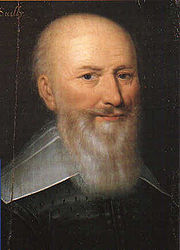 |
Maximilien de Béthune, duc de Sully | 1589 | 1610 | Henry IV Henry IV of France Henry IV , Henri-Quatre, was King of France from 1589 to 1610 and King of Navarre from 1572 to 1610. He was the first monarch of the Bourbon branch of the Capetian dynasty in France.... |
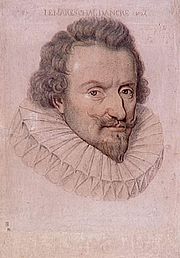 |
Concino Concini Concino Concini Concino Concini, Count della Penna, Marquis et Maréchal d'Ancre , was an Italian politician, best known for being a minister of Louis XIII of France, as the favourite of his mother.-Life:... |
1610 | 24 April 1617 (died) |
Louis XIII Louis XIII of France Louis XIII was a Bourbon monarch who ruled as King of France and of Navarre from 1610 to 1643.Louis was only eight years old when he succeeded his father. His mother, Marie de Medici, acted as regent during Louis' minority... |
| Armand-Jean du Plessis, Cardinal Richelieu | 1624 | 4 December 1642 (died) |
||
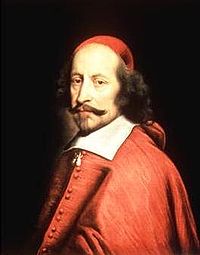 |
Jules Cardinal Mazarin | 1643 | 9 March 1661 (died) |
Louis XIV Louis XIV of France Louis XIV , known as Louis the Great or the Sun King , was a Bourbon monarch who ruled as King of France and Navarre. His reign, from 1643 to his death in 1715, began at the age of four and lasted seventy-two years, three months, and eighteen days... |
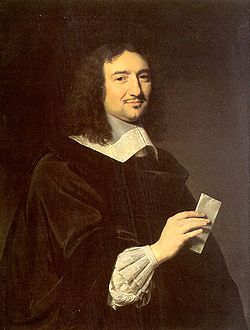 |
Jean-Baptiste Colbert Jean-Baptiste Colbert Jean-Baptiste Colbert was a French politician who served as the Minister of Finances of France from 1665 to 1683 under the rule of King Louis XIV. His relentless hard work and thrift made him an esteemed minister. He achieved a reputation for his work of improving the state of French manufacturing... |
1661 | 6 September 1683 (died) |
|
| — | absolute rule by Louis XIV Louis XIV of France Louis XIV , known as Louis the Great or the Sun King , was a Bourbon monarch who ruled as King of France and Navarre. His reign, from 1643 to his death in 1715, began at the age of four and lasted seventy-two years, three months, and eighteen days... |
1683 | 1715 | |
| Guillaume Cardinal Dubois Guillaume Dubois Guillaume Dubois was a French cardinal and statesman.-Early years:Dubois, the third of the four great Cardinal-Ministers , was born in Brive-la-Gaillarde, in Limousin... |
1715 | 10 August 1723 (died) |
Louis XV Louis XV of France Louis XV was a Bourbon monarch who ruled as King of France and of Navarre from 1 September 1715 until his death. He succeeded his great-grandfather at the age of five, his first cousin Philippe II, Duke of Orléans, served as Regent of the kingdom until Louis's majority in 1723... |
|
.jpg) |
Philippe II, Duc d'Orléans Philippe II, Duke of Orléans Philippe d'Orléans was a member of the royal family of France and served as Regent of the Kingdom from 1715 to 1723. Born at his father's palace at Saint-Cloud, he was known from birth under the title of Duke of Chartres... |
August 1723 | 2 December 1723 (died) |
|
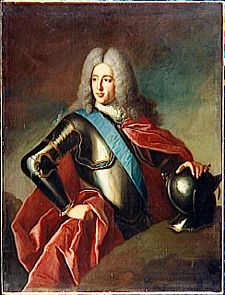 |
Louis Henri, Duc de Bourbon | December 1723 | 1726 | |
 |
André-Hercule Cardinal de Fleury | 1726 | 1743 | |
| — | absolute rule by Louis XV Louis XV of France Louis XV was a Bourbon monarch who ruled as King of France and of Navarre from 1 September 1715 until his death. He succeeded his great-grandfather at the age of five, his first cousin Philippe II, Duke of Orléans, served as Regent of the kingdom until Louis's majority in 1723... |
1743 | 1758 | |
| Étienne François, duc de Choiseul Étienne François, duc de Choiseul Étienne-François, comte de Stainville, duc de Choiseul was a French military officer, diplomat and statesman. Between 1758 and 1761, and 1766 and 1770, he was Foreign Minister of France and had a strong influence on France's global strategy throughout the period... |
1758 | 1770 | ||
,.jpg) |
Emmanuel-Armand de Richelieu, duc d'Aiguillon Emmanuel-Armand de Richelieu, duc d'Aiguillon Emmanuel-Armand de Vignerot du Plessis de Richelieu, duc d'Aiguillon was a French soldier and statesman and a nephew of Louis François Armand du Plessis, duc de Richelieu. He served as the Minister of Foreign Affairs under Louis XV.-Early life:Before the death of his father, he was known at court... |
1771 | 1774 | |
| Jean-Frédéric Phélypeaux, comte de Maurepas | 1774 | 1781 | Louis XVI Louis XVI of France Louis XVI was a Bourbon monarch who ruled as King of France and Navarre until 1791, and then as King of the French from 1791 to 1792, before being executed in 1793.... |
|
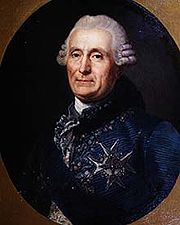 |
Charles Gravier, comte de Vergennes Charles Gravier, comte de Vergennes Charles Gravier, comte de Vergennes was a French statesman and diplomat. He served as Foreign Minister from 1774 during the reign of Louis XVI, notably during the American War of Independence.... |
1781 | 1787 | |
| Étienne Charles de Loménie de Brienne Étienne Charles de Loménie de Brienne Étienne Charles de Loménie de Brienne was a French churchman, politician and finance minister of Louis XVI.-Life:... |
1787 | 1788 | ||
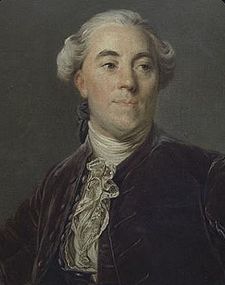 |
Jacques Necker Jacques Necker Jacques Necker was a French statesman of Swiss birth and finance minister of Louis XVI, a post he held in the lead-up to the French Revolution in 1789.-Early life:... |
1788 | 1789 | |
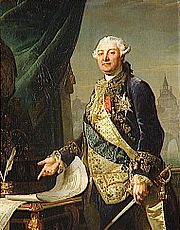 |
Louis Auguste Le Tonnelier de Breteuil Louis Auguste Le Tonnelier de Breteuil Louis Charles Auguste le Tonnelier, baron de Breteuil, baron de Preuilly was a French aristocrat, diplomat, statesman and politician... |
1789 | ||
 |
Jacques Necker Jacques Necker Jacques Necker was a French statesman of Swiss birth and finance minister of Louis XVI, a post he held in the lead-up to the French Revolution in 1789.-Early life:... |
1789 | 1790 | |
 |
Armand Marc, comte de Montmorin Armand Marc, comte de Montmorin Armand Marc, comte de Montmorin de Saint Herem was a French statesman. He was Minister of Foreign Affairs and the Navy under Louis XVI.... |
1790 | 1791 | |
French First RepublicFrench First RepublicThe French First Republic was founded on 22 September 1792, by the newly established National Convention. The First Republic lasted until the declaration of the First French Empire in 1804 under Napoleon I...
(1792-1804)
During the First French Republic periods the arrangements for the direction of the government of France changed frequently and there was no office of Prime Minister. See the relevant article for details.First French EmpireFirst French EmpireThe First French Empire , also known as the Greater French Empire or Napoleonic Empire, was the empire of Napoleon I of France...
(1804-1815)
During the First French EmpireFirst French Empire
The First French Empire , also known as the Greater French Empire or Napoleonic Empire, was the empire of Napoleon I of France...
periods the arrangements for the direction of the government of France changed frequently and there was no office of Prime Minister. See the relevant article for details.
Presidents of the Council of Ministers
Political Party:| Portrait | Name | Took office | Left office | Political Party | Legislature (Election) |
King (Reign) |
||
|---|---|---|---|---|---|---|---|---|
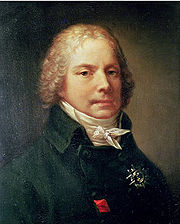 |
Charles Maurice de Talleyrand-Périgord, Prince de Benevente | 9 July 1815 | 26 September 1815 | I Chambre introuvable La Chambre introuvable was the first Chamber of Deputies elected after the Second Bourbon Restoration in 1815. It was dominated by Ultra-royalists who completely refused to accept the results of the French Revolution... (1815 French legislative election, 1815 French legislative elections were held on 18 and 24 August for the first legislature of the Bourbon Restoration.Electoral colleges elected a number of candidates equal to the number of deputies... ) |
Louis XVIII Louis XVIII of France Louis XVIII , known as "the Unavoidable", was King of France and of Navarre from 1814 to 1824, omitting the Hundred Days in 1815...  (1815–1824) |
|||
| Armand-Emmanuel du Plessis, duc de Richelieu (1st time) |
26 September 1815 | 29 December 1818 | ||||||
| II (1816 French legislative election, 1816 The 1816 French general election organized the first legislature of the Second Restoration. The election was held on 25 September and 4 October.Only citizens paying taxes were eligible to vote.... ) |
||||||||
| Jean-Joseph, Marquis Dessolles Jean-Joseph, Marquis Dessolles Jean Joseph Paul Augustin, Marquis Dessolles was a French statesman. He was the prime minister of France from 29 December 1818 to 18 November 1819.... |
29 December 1818 | 19 November 1819 | ||||||
| Élie, comte Decazes Élie, duc Decazes Élie Decazes, 1st duc Decazes and 1st Duke of Glücksbierg , was a French statesman, known from 1815 to 1820 as 1st comte Decazes in France, 1st Duke of Glücksbierg in Denmark in 1818, and 1st duc Decazes in France in 1820 .-Early life:Élie Decazes was born at Saint-Martin-de-Laye, Gironde, son of... |
19 November 1819 | 20 February 1820 | Constitutionalist Constitutional monarchy Constitutional monarchy is a form of government in which a monarch acts as head of state within the parameters of a constitution, whether it be a written, uncodified or blended constitution... |
|||||
| Armand-Emmanuel du Plessis, duc de Richelieu (2nd time) |
20 February 1820 | 14 December 1821 | ||||||
| III (1820 French legislative election, 1820 The 1820 general election organized the second legislature of the Second Restoration. The election was held on 4 and 13 November.Only citizens paying taxes were eligible to vote.... ) |
||||||||
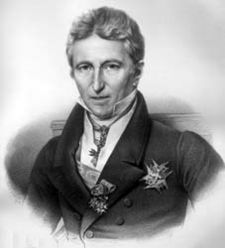 |
Jean-Baptiste de Villèle | 14 December 1821 | 4 January 1828 | Ultra-royalist Ultra-royalist Ultra-Royalists or simply Ultras were a reactionary faction which sat in the French parliament from 1815 to 1830 under the Bourbon Restoration... |
||||
| Charles X Charles X of France Charles X was known for most of his life as the Comte d'Artois before he reigned as King of France and of Navarre from 16 September 1824 until 2 August 1830. A younger brother to Kings Louis XVI and Louis XVIII, he supported the latter in exile and eventually succeeded him... (1824–1830) |
||||||||
 |
Jean-Baptiste Gay, vicomte de Martignac | 4 January 1828 | 8 August 1829 | Ultra-royalist Ultra-royalist Ultra-Royalists or simply Ultras were a reactionary faction which sat in the French parliament from 1815 to 1830 under the Bourbon Restoration... |
IV (1827 French legislative election, 1827 The 1827 general election organized the third legislature of the Second Restoration. The election was held on 17 and 24 November.Only citizens paying taxes were eligible to vote, and despite this, the Ultra-royalists loyal to Charles X of France came in second.Charles X of France dissolved this... ) |
|||
| Jules, Prince de Polignac Jules, prince de Polignac Prince Jules de Polignac, 3rd Duke of Polignac , was a French statesman. He played a part in ultra-royalist reaction after the Revolution... |
8 August 1829 | 29 July 1830 | Ultra-royalist Ultra-royalist Ultra-Royalists or simply Ultras were a reactionary faction which sat in the French parliament from 1815 to 1830 under the Bourbon Restoration... |
|||||
Presidents of the Council of Ministers
Political Party:| Portrait | Name | Took office | Left office | Political Party | Legislature (Election) |
King July Monarchy The July Monarchy , officially the Kingdom of France , was a period of liberal constitutional monarchy in France under King Louis-Philippe starting with the July Revolution of 1830 and ending with the Revolution of 1848... (Reign) |
||
|---|---|---|---|---|---|---|---|---|
| — | Position vacant | 29 July 1830 | 13 August 1830 | I (1830 French legislative election, 1830 The 1830 general election organized the first legislature of the July Monarchy but was meant to organize the sixth legislature of the Bourbon Restoration... ) |
Louis-Philippe I (1830–1848) |
|||
| Victor, duc de Broglie Victor, 3rd duc de Broglie Achille-Léonce-Victor-Charles, 3rd duc de Broglie, called Victor de Broglie was a French statesman and diplomat. He was twice President of the Council during the July Monarchy, from August 1830 to November 1830 and from March 1835 to February 1836... |
1 | 13 August 1830 | 2 November 1830 | Orléanist Orléanist The Orléanists were a French right-wing/center-right party which arose out of the French Revolution. It governed France 1830-1848 in the "July Monarchy" of king Louis Philippe. It is generally seen as a transitional period dominated by the bourgeoisie and the conservative Orleanist doctrine in... |
||||
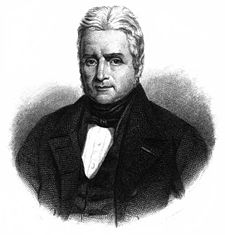 |
Jacques Laffitte Jacques Laffitte Jacques Laffitte was a French banker and politician.-Biography:Laffitte was born at Bayonne, one of the ten children of a carpenter.... |
2 November 1830 | 13 March 1831 | Orléanist Orléanist The Orléanists were a French right-wing/center-right party which arose out of the French Revolution. It governed France 1830-1848 in the "July Monarchy" of king Louis Philippe. It is generally seen as a transitional period dominated by the bourgeoisie and the conservative Orleanist doctrine in... |
||||
| Casimir Pierre Perier Casimir Pierre Perier Casimir Pierre Perier was a French statesman, President of the Council during the July Monarchy, when he headed the conservative Parti de la résistance .-Life:... |
13 March 1831 | 16 May 1832 | Orléanist Orléanist The Orléanists were a French right-wing/center-right party which arose out of the French Revolution. It governed France 1830-1848 in the "July Monarchy" of king Louis Philippe. It is generally seen as a transitional period dominated by the bourgeoisie and the conservative Orleanist doctrine in... |
II (1831 French legislative election, 1831 The 1831 general election organized the second legislature of the July Monarchy. The election was held on 5 July.Only citizens paying taxes were eligible to vote.-Results:- Sources :*... ) |
||||
| — | Position vacant | 16 May 1832 | 11 October 1832 | |||||
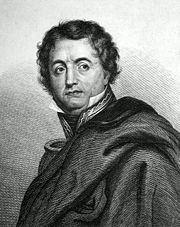 |
Jean-de-Dieu Soult, duc de Dalmatie | 1 | 11 October 1832 | 18 July 1834 | ||||
 |
Étienne Maurice, comte Gérard Étienne Maurice Gérard Étienne Maurice Gérard, comte Gérard was a French general and statesman. He served under a succession of French governments including the ancien regime monarchy, the Revolutionary governments, the Restorations, the July Monarchy, the First and Second Republics, and the First Empire , becoming... |
18 July 1834 | 10 November 1834 | |||||
| Hugues-Bernard Maret, duc de Bassano Hugues-Bernard Maret, duc de Bassano Hugues-Bernard Maret, 1st Duc de Bassano was a French statesman and journalist.-Early career:Born at Dijon , he received a solid education, and then entered the legal profession – becoming a lawyer at the King's Council in Paris... |
10 November 1834 | 18 November 1834 | ||||||
| Édouard Mortier, duc de Treviso Édouard Adolphe Casimir Joseph Mortier Édouard Adolphe Casimir Joseph Mortier, 1st Duc de Trévise was a French general and Marshal of France under Napoleon I.-Biography:... |
18 November 1834 | 12 March 1835 | III (1834 French legislative election, 1834 The 1834 general election organized the third legislature of the July Monarchy. The election was held on 21 June.Only citizens paying taxes were eligible to vote.-Results:Louis-Philippe of France dissolved the legislature on 3 October 1837.... ) |
|||||
| Victor, duc de Broglie Victor, 3rd duc de Broglie Achille-Léonce-Victor-Charles, 3rd duc de Broglie, called Victor de Broglie was a French statesman and diplomat. He was twice President of the Council during the July Monarchy, from August 1830 to November 1830 and from March 1835 to February 1836... |
2 | 12 March 1835 | 22 February 1836 | Orléanist Orléanist The Orléanists were a French right-wing/center-right party which arose out of the French Revolution. It governed France 1830-1848 in the "July Monarchy" of king Louis Philippe. It is generally seen as a transitional period dominated by the bourgeoisie and the conservative Orleanist doctrine in... |
||||
| Adolphe Thiers Adolphe Thiers Marie Joseph Louis Adolphe Thiers was a French politician and historian. was a prime minister under King Louis-Philippe of France. Following the overthrow of the Second Empire he again came to prominence as the French leader who suppressed the revolutionary Paris Commune of 1871... |
1 | 22 February 1836 | 6 September 1836 | Orléanist Orléanist The Orléanists were a French right-wing/center-right party which arose out of the French Revolution. It governed France 1830-1848 in the "July Monarchy" of king Louis Philippe. It is generally seen as a transitional period dominated by the bourgeoisie and the conservative Orleanist doctrine in... /Parti du Mouvement |
||||
| Louis-Mathieu Molé | 1 | 6 September 1836 | 31 March 1839 | Orléanist Orléanist The Orléanists were a French right-wing/center-right party which arose out of the French Revolution. It governed France 1830-1848 in the "July Monarchy" of king Louis Philippe. It is generally seen as a transitional period dominated by the bourgeoisie and the conservative Orleanist doctrine in... |
||||
| 2 | IV (1837 French legislative election, 1837 The 1837 general election organized the fourth legislature of the July Monarchy. The election was held on 4 November.Only citizens paying taxes were eligible to vote.... ) |
|||||||
| — | Position vacant | 31 March 1839 | 12 May 1839 | |||||
 |
Jean-de-Dieu Soult, duc de Dalmatie | 2 | 12 May 1839 | 1 March 1840 | V (1839 French legislative election, 1839 The 1839 general election organized the fifth legislature of the July Monarchy. The election was held on 2 March and 6 July.Only citizens paying taxes were eligible to vote. The left won the election with a majority of 240 seats over the right.-Results:... ) |
|||
| Adolphe Thiers Adolphe Thiers Marie Joseph Louis Adolphe Thiers was a French politician and historian. was a prime minister under King Louis-Philippe of France. Following the overthrow of the Second Empire he again came to prominence as the French leader who suppressed the revolutionary Paris Commune of 1871... |
2 | 1 March 1840 | 29 October 1840 | Orléanist Orléanist The Orléanists were a French right-wing/center-right party which arose out of the French Revolution. It governed France 1830-1848 in the "July Monarchy" of king Louis Philippe. It is generally seen as a transitional period dominated by the bourgeoisie and the conservative Orleanist doctrine in... /Parti du Mouvement |
||||
 |
Jean-de-Dieu Soult, duc de Dalmatie | 3 | 29 October 1840 | 19 September 1847 | ||||
| VI (1842 French legislative election, 1842 The 1842 general election organized the sixth legislature of the July Monarchy. The election was held on 9 July.Only citizens paying taxes were eligible to vote.-Results:Louis-Philippe of France dissolved the legislature on 16 July 1846.- Sources :... ) |
||||||||
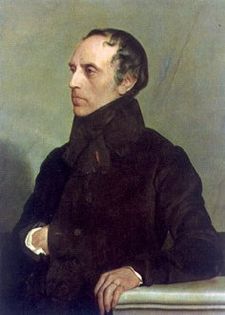 |
François Guizot François Guizot François Pierre Guillaume Guizot was a French historian, orator, and statesman. Guizot was a dominant figure in French politics prior to the Revolution of 1848, a conservative liberal who opposed the attempt by King Charles X to usurp legislative power, and worked to sustain a constitutional... |
19 September 1847 | 23 February 1848 | Orléanist Orléanist The Orléanists were a French right-wing/center-right party which arose out of the French Revolution. It governed France 1830-1848 in the "July Monarchy" of king Louis Philippe. It is generally seen as a transitional period dominated by the bourgeoisie and the conservative Orleanist doctrine in... |
VII (1846 French legislative election, 1846 The 1846 general election organized the seventh legislature of the July Monarchy. The election was held on 1 August.Only citizens paying taxes were eligible to vote.-Results:The legislature ended with the French Revolution of 1848.- Sources :*... ) |
|||
| Louis-Mathieu Molé | 3 | 23 February 1848 | 24 February 1848 | Orléanist Orléanist The Orléanists were a French right-wing/center-right party which arose out of the French Revolution. It governed France 1830-1848 in the "July Monarchy" of king Louis Philippe. It is generally seen as a transitional period dominated by the bourgeoisie and the conservative Orleanist doctrine in... |
||||
Leaders of Provisional Governments
Political Party:| Portrait | Name | Took office | Left office | Political Party | Legislature (Election) |
||
|---|---|---|---|---|---|---|---|
| Jacques-Charles Dupont de l'Eure Jacques-Charles Dupont de l'Eure Jacques-Charles Dupont de l'Eure was a French lawyer and statesman.He is best known as the first head of state of the Second Republic, after the collapse of the July Monarchy.-Early career:... |
• | 24 February 1848 | 9 May 1848 | Republican French Second Republic The French Second Republic was the republican government of France between the 1848 Revolution and the coup by Louis-Napoléon Bonaparte which initiated the Second Empire. It officially adopted the motto Liberté, Égalité, Fraternité... |
Constituent (1848 French Constituent Assembly election, 1848 The 1848 general election held on 23 and 24 April 1848 elected the Constituent Assembly of the new Republic. Over 9 million voters were eligible to vote in the first French election since 1792 held under male universal suffrage.-Results:- Sources :... ) |
||
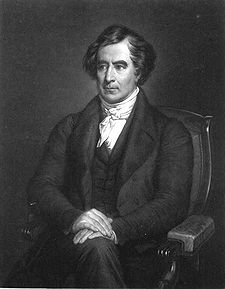 |
François Arago François Arago François Jean Dominique Arago , known simply as François Arago , was a French mathematician, physicist, astronomer and politician.-Early life and work:... |
• | 10 May 1848 | 24 June 1848 | Republican French Second Republic The French Second Republic was the republican government of France between the 1848 Revolution and the coup by Louis-Napoléon Bonaparte which initiated the Second Empire. It officially adopted the motto Liberté, Égalité, Fraternité... |
||
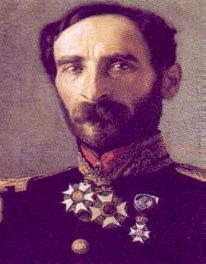 |
Louis-Eugène Cavaignac | • | 28 June 1848 | 20 December 1848 | Republican French Second Republic The French Second Republic was the republican government of France between the 1848 Revolution and the coup by Louis-Napoléon Bonaparte which initiated the Second Empire. It officially adopted the motto Liberté, Égalité, Fraternité... |
||
Presidents of the Council of Ministers
Political Party:| Portrait | Name | Took office | Left office | Political Party | Legislature (Election) |
President (Term) |
||
|---|---|---|---|---|---|---|---|---|
| Odilon Barrot Odilon Barrot Camille Hyacinthe Odilon Barrot was a French politician.-Early life:Barrot was born at Villefort Lozère. He belonged to a legal family, his father, an advocate of Toulouse, having been a member of the Convention who had voted against the death of Louis XVI. Odilon Barrot's earliest recollections... |
1 | 20 December 1848 | 31 October 1849 | Parti de l'Ordre Parti de l'Ordre The Parti de l'Ordre was a French Orleanist and Legitimist conservative political party that existed during the Second Republic.... |
Constituent (1848 French Constituent Assembly election, 1848 The 1848 general election held on 23 and 24 April 1848 elected the Constituent Assembly of the new Republic. Over 9 million voters were eligible to vote in the first French election since 1792 held under male universal suffrage.-Results:- Sources :... ) |
Louis-Napoléon Bonaparte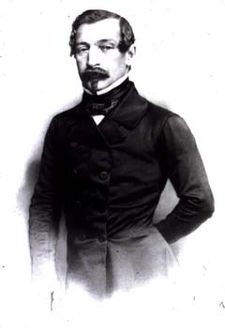 (1848–1852) |
||
| 2 | Legislative (1849 French legislative election, 1849 French legislative elections were held on 13 May 1849. Voters elected the first National Assembly of the Second Republic.The conservative Parti de l'Ordre won an overall majority of 450 seats.The Parti de l'Ordre was a bourgeois, traditionalist, and conservative party opposed to the Presidency of... ) |
|||||||
| Alphonse Henri, comte d'Hautpoul Alphonse Henri, comte d'Hautpoul Alphonse Henri, comte d'Hautpoul was Prime Minister of France from 31 October 1849 to 10 April 1851 during the French Second Republic.-Biography:... |
• | 31 October 1849 | 10 April 1851 | Parti de l'Ordre Parti de l'Ordre The Parti de l'Ordre was a French Orleanist and Legitimist conservative political party that existed during the Second Republic.... |
||||
| Léon Faucher Léon Faucher Léonard Joseph Léon Faucher was a French politician and economist.Faucher was born at Limoges, Haute-Vienne. When he was nine years old the family removed to Toulouse, where the boy was sent to school... |
• | 10 April 1851 | 26 October 1851 | Parti de l'Ordre Parti de l'Ordre The Parti de l'Ordre was a French Orleanist and Legitimist conservative political party that existed during the Second Republic.... |
||||
| — | Position vacant (government led by Louis-Napoléon Bonaparte) |
0 | 26 October 1851 | 2 December 1852 | (Bonapartist Bonapartist In French political history, Bonapartism has two meanings. In a strict sense, this term refers to people who aimed to restore the French Empire under the House of Bonaparte, the Corsican family of Napoleon Bonaparte and his nephew Louis... ) |
|||
| 1 | ||||||||
| 2 | ||||||||
Cabinet Chiefs
Political Party:| Portrait | Name | Took office | Left office | Political Party | Legislature (Election) |
Emperor Emperor of the French The Emperor of the French was the title used by the Bonaparte Dynasty starting when Napoleon Bonaparte was given the title Emperor on 18 May 1804 by the French Senate and was crowned emperor of the French on 02 December 1804 at the cathedral of Notre Dame de Paris, in Paris with the Crown of... (Reign) |
||
|---|---|---|---|---|---|---|---|---|
| — | Position vacant (absolute rule by Napoleon III) |
3 | 2 December 1852 | 27 December 1869 | (Bonapartist Bonapartist In French political history, Bonapartism has two meanings. In a strict sense, this term refers to people who aimed to restore the French Empire under the House of Bonaparte, the Corsican family of Napoleon Bonaparte and his nephew Louis... ) |
I (1852 French legislative election, 1852 The 1852 general election organized the first legislature of the French Second Empire. The election was held on 29 February and 14 March. Out of 9,836,043 registered voters, 6,222,983 voted .... ) |
Napoleon III (1852–1870) |
|
| II (1857 French legislative election, 1857 The 1857 general election organized the second legislature of the French Second Empire. The election was held on 21 June and 5 July.According to the constitution of the empire, partisans of the regime ran as "official candidates" of the regime in often gerrymandered circonscriptions... ) |
||||||||
| III (1863 French legislative election, 1863 The 1863 general election elected the third legislature of the French Second Empire. The first round was held on 31 May, the second round on 14 June.-Results:- Sources :*... ) |
||||||||
| 4 | IV (1869 French legislative election, 1869 The 1869 general election elected the fourth legislature of the French Second Empire. The first round was held on 23 May the second round on 6 June. These elections resulted in a victory for the liberal opposition to the authoritarian French Second Empire.... ) |
|||||||
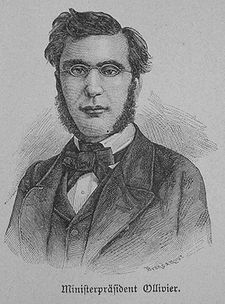 |
Émile Ollivier Émile Ollivier Olivier Émile Ollivier was a French statesman. Although a republican, he served as a cabinet minister under Emperor Napoleon III and led the process of turning his regime into a "liberal Empire".-Early life and career:Émile Ollivier was born in Marseille... |
• | 2 January 1870 | 9 August 1870 | Independent Republican, but serving under Napoleon III |
|||
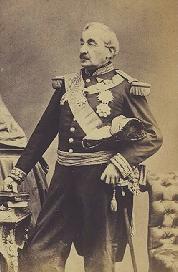 |
Charles Cousin-Montauban, comte de Palikao Charles Cousin-Montauban, Comte de Palikao Charles Guillaume Marie Appollinaire Antoine Cousin Montauban, comte de Palikao was a French general and statesman.-Biography:Montauban was born in Paris. As a cavalry officer he saw much service in Algeria, but he was still only a colonel when in 1847 he effected the capture of Abdel Kadir... |
• | 9 August 1870 | 4 September 1870 | Military Military A military is an organization authorized by its greater society to use lethal force, usually including use of weapons, in defending its country by combating actual or perceived threats. The military may have additional functions of use to its greater society, such as advancing a political agenda e.g... |
|||
President of the Government of National DefenseGovernment of National DefenseLe Gouvernement de la Défense Nationale, or The Government of National Defence, was the first Government of the Third Republic of France from September 4, 1870, to February 13, 1871, during the Franco-Prussian War, formed after the Emperor Louis Napoleon III was captured by the Prussian army. The...
| Portrait | Name | Took office | Left office | Political Party | Legislature | |
|---|---|---|---|---|---|---|
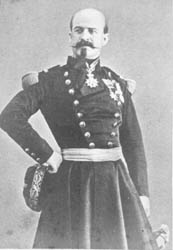 |
Louis Jules Trochu Louis Jules Trochu Louis Jules Trochu was a French military leader and politician. He served as President of the Government of National Defense—France's de facto head of state—from 4 September 1870 until his resignation on 22 January 1871 .- Military career :He was born at Palais... |
4 September 1870 | 22 January 1871 | Military Military A military is an organization authorized by its greater society to use lethal force, usually including use of weapons, in defending its country by combating actual or perceived threats. The military may have additional functions of use to its greater society, such as advancing a political agenda e.g... |
Government of National Defense Government of National Defense Le Gouvernement de la Défense Nationale, or The Government of National Defence, was the first Government of the Third Republic of France from September 4, 1870, to February 13, 1871, during the Franco-Prussian War, formed after the Emperor Louis Napoleon III was captured by the Prussian army. The... |
|
Presidents of the Council of Ministers
Political Party:| Portrait | Name | Took office | Left office | Political Party (Coalition) | Legislature (Election) |
President (Term) |
||
|---|---|---|---|---|---|---|---|---|
 |
Jules Armand Dufaure Jules Armand Dufaure Jules Armand Stanislas Dufaure was a French statesman.-Biography:Dufaure was born at Saujon, Charente-Maritime, and began his career as an advocate at Bordeaux, where he won a great reputation by his oratorical gifts. He abandoned law for politics, and in 1834 was elected deputy... |
1 | 19 February 1871 | 24 May 1873 | Independent Independent (politician) In politics, an independent or non-party politician is an individual not affiliated to any political party. Independents may hold a centrist viewpoint between those of major political parties, a viewpoint more extreme than any major party, or they may have a viewpoint based on issues that they do... (moderate Republican) |
National Assembly National Assembly (1871) The National Assembly was a French body elected on 8 February 1871 in the wake of the armistice signed on 26 January 1871 at the end of the Franco-Prussian War... (1871 French legislative election, February 1871 French legislative elections to elect the first legislature of the French Third Republic were held on 8 February 1871.This election was held during an explosive situation in the country: following the Franco-Prussian War, 43 departments were occupied. Thus, all public meetings were outlawed... ) |
Adolphe Thiers Adolphe Thiers Marie Joseph Louis Adolphe Thiers was a French politician and historian. was a prime minister under King Louis-Philippe of France. Following the overthrow of the Second Empire he again came to prominence as the French leader who suppressed the revolutionary Paris Commune of 1871... (1871–1873) |
|
| 2 | ||||||||
 |
Albert, duc de Broglie Albert, 4th duc de Broglie Jacques-Victor-Albert, 4th duc de Broglie was a French monarchist politician.-Biography:Albert de Broglie was born in Paris, France, the third child and eldest son of Victor, 3rd duc de Broglie, a liberal statesman of the July Monarchy, and Albertine, baroness Staël von Holstein, the fourth child... |
1 | 25 May 1873 | 22 May 1874 | Monarchist | Patrice de Mac-Mahon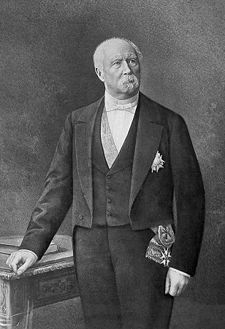 (1873–1879) |
||
| 2 | ||||||||
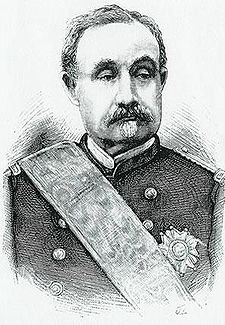 |
Ernest Courtot de Cissey Ernest Courtot de Cissey Ernest Louis Octave Courtot de Cissey was a French general.He was born in Paris, educated at the Prytanée National Militaire, and after passing through St Cyr, entered the army in 1832, becoming captain in 1839.... |
• | 22 May 1874 | 10 March 1875 | Independent Independent (politician) In politics, an independent or non-party politician is an individual not affiliated to any political party. Independents may hold a centrist viewpoint between those of major political parties, a viewpoint more extreme than any major party, or they may have a viewpoint based on issues that they do... |
|||
 |
Louis Buffet Louis Buffet Louis Joseph Buffet was a French statesman.He was born at Mirecourt, Vosges. After the revolution of February 1848 he was elected deputy for the department of the Vosges, and in the Assembly sat on the right, pronouncing for the repression of the insurrection of June 1848 and for Louis Napoleon... |
• | 10 March 1875 | 23 February 1876 | Monarchist | |||
 |
Jules Armand Dufaure Jules Armand Dufaure Jules Armand Stanislas Dufaure was a French statesman.-Biography:Dufaure was born at Saujon, Charente-Maritime, and began his career as an advocate at Bordeaux, where he won a great reputation by his oratorical gifts. He abandoned law for politics, and in 1834 was elected deputy... |
3 | 23 February 1876 | 12 December 1876 | Independent Independent (politician) In politics, an independent or non-party politician is an individual not affiliated to any political party. Independents may hold a centrist viewpoint between those of major political parties, a viewpoint more extreme than any major party, or they may have a viewpoint based on issues that they do... (moderate Republican) |
|||
| 4 | ||||||||
| Jules Simon Jules Simon Jules François Simon was a French statesman and philosopher, and one of the leader of the Opportunist Republicans faction.-Biography:Simon was born at Lorient. His father was a linen-draper from Lorraine, who renounced Protestantism before his second marriage with a Catholic Breton. Jules Simon... |
• | 12 December 1876 | 17 May 1877 | Left Republican Democratic Republican Alliance The Democratic Republican Alliance was a French political party created in 1901 by followers of Léon Gambetta, such as Raymond Poincaré who would be president of the Council in the 1920s... |
I (1876 French legislative election, 1876 The 1876 general election held to elect the second legislature of the French Third Republic was held on 20 February and 5 March 1876. 75.90% of eligible voters voted.-Parliamentary Groups:- Sources :*... ) |
|||
 |
Albert, duc de Broglie | 3 | 17 May 1877 | 23 November 1877 | Monarchist | |||
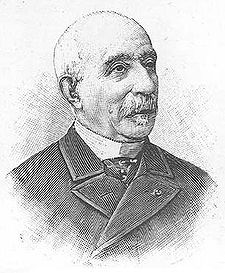 |
Gaëtan de Rochebouët Gaëtan de Rochebouët Gaëtan de Grimaudet de Rochebouët was a French general who served as Prime Minister for less than a month in late 1877.On 29 June 1877, Patrice de MacMahon dissolved the House after being outvoted. The elections of 14 October 1877 were a victory for Republicans, who won majority of seats.... |
• | 23 November 1877 | 13 December 1877 | Conservative | II (1877 French legislative election, 1877 The 1877 general election held to elect the third legislature of the 3rd Republic was held on 14 and 28 October 1877 after President Patrice de MacMahon dissolved the National Assembly, elected in 1876 to benefit the conservatives and royalists... ) |
||
 |
Jules Armand Dufaure Jules Armand Dufaure Jules Armand Stanislas Dufaure was a French statesman.-Biography:Dufaure was born at Saujon, Charente-Maritime, and began his career as an advocate at Bordeaux, where he won a great reputation by his oratorical gifts. He abandoned law for politics, and in 1834 was elected deputy... |
5 | 13 December 1877 | 4 February 1879 | Independent Independent (politician) In politics, an independent or non-party politician is an individual not affiliated to any political party. Independents may hold a centrist viewpoint between those of major political parties, a viewpoint more extreme than any major party, or they may have a viewpoint based on issues that they do... (moderate Republican) |
|||
 |
William Henry Waddington William Henry Waddington William Henry Waddington was a French statesman who was Prime Minister of France in 1879.-Early life and education:... |
• | 4 February 1879 | 28 December 1879 | Independent Independent (politician) In politics, an independent or non-party politician is an individual not affiliated to any political party. Independents may hold a centrist viewpoint between those of major political parties, a viewpoint more extreme than any major party, or they may have a viewpoint based on issues that they do... (moderate Republican) |
Jules Grévy Jules Grévy François Paul Jules Grévy was a President of the French Third Republic and one of the leaders of the Opportunist Republicans faction. Given that his predecessors were monarchists who tried without success to restore the French monarchy, Grévy is seen as the first real republican President of... (1879–1887) |
||
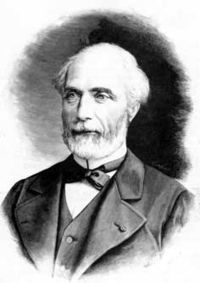 |
Charles de Freycinet Charles de Freycinet Charles Louis de Saulces de Freycinet was a French statesman and Prime Minister during the Third Republic; he belonged to the Opportunist Republicans faction. He was elected a member of the Academy of Sciences, and in 1890, the fourteen member to occupy seat the Académie française.-Early years:He... |
1 | 28 December 1879 | 23 September 1880 | Opportunist Republican | |||
 |
Jules Ferry Jules Ferry Jules François Camille Ferry was a French statesman and republican. He was a promoter of laicism and colonial expansion.- Early life :Born in Saint-Dié, in the Vosges département, France, he studied law, and was called to the bar at Paris in 1854, but soon went into politics, contributing to... |
1 | 23 September 1880 | 14 November 1881 | Left Republican Democratic Republican Alliance The Democratic Republican Alliance was a French political party created in 1901 by followers of Léon Gambetta, such as Raymond Poincaré who would be president of the Council in the 1920s... |
|||
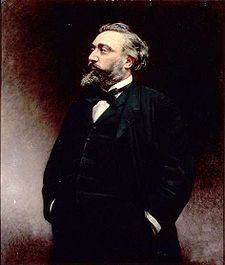 |
Léon Gambetta Léon Gambetta Léon Gambetta was a French statesman prominent after the Franco-Prussian War.-Youth and education:He is said to have inherited his vigour and eloquence from his father, a Genovese grocer who had married a Frenchwoman named Massabie. At the age of fifteen, Gambetta lost the sight of his right eye... |
• | 14 November 1881 | 30 January 1882 | Opportunist Republican | III (1881 French legislative election, 1881 The 1881 general election was held on 21 August and 4 September 1881. This election marked the collapse of the right compared to the 1877 election. 70.55% of eligible voters participated.-Parliamentary Groups:- Sources :*... ) |
||
 |
Charles de Freycinet Charles de Freycinet Charles Louis de Saulces de Freycinet was a French statesman and Prime Minister during the Third Republic; he belonged to the Opportunist Republicans faction. He was elected a member of the Academy of Sciences, and in 1890, the fourteen member to occupy seat the Académie française.-Early years:He... |
2 | 30 January 1882 | 7 August 1882 | Opportunist Republican | |||
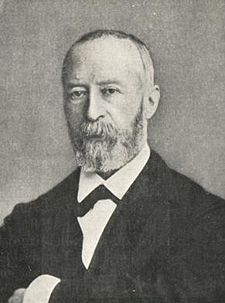 |
Charles Duclerc Charles Duclerc Charles Théodore Eugène Duclerc was a French journalist and politician of the Third Republic. He was a member of the editorial board of the National newspaper. Duclerc served as Minister of Finance from May through June in the Provisional government of France... |
• | 7 August 1882 | 29 January 1883 | Left Republican Democratic Republican Alliance The Democratic Republican Alliance was a French political party created in 1901 by followers of Léon Gambetta, such as Raymond Poincaré who would be president of the Council in the 1920s... |
|||
 |
Armand Fallières Armand Fallières Clément Armand Fallières was a French politician, president of the French republic from 1906 to 1913.He was born at Mézin in the département of Lot-et-Garonne, France, where his father was clerk of the peace... |
• | 29 January 1883 | 21 February 1883 | Left Republican Democratic Republican Alliance The Democratic Republican Alliance was a French political party created in 1901 by followers of Léon Gambetta, such as Raymond Poincaré who would be president of the Council in the 1920s... |
|||
 |
Jules Ferry Jules Ferry Jules François Camille Ferry was a French statesman and republican. He was a promoter of laicism and colonial expansion.- Early life :Born in Saint-Dié, in the Vosges département, France, he studied law, and was called to the bar at Paris in 1854, but soon went into politics, contributing to... |
2 | 21 February 1883 | 6 April 1885 | Left Republican Democratic Republican Alliance The Democratic Republican Alliance was a French political party created in 1901 by followers of Léon Gambetta, such as Raymond Poincaré who would be president of the Council in the 1920s... |
|||
| Henri Brisson Henri Brisson Eugène Henri Brisson was a French statesman, Prime Minister of France for a period in 1885-1886 and again in 1898.-Biography:He was born at Bourges , and followed his father’s profession of advocate. Having made his mark in opposition during the last days of the empire, he was appointed... |
1 | 6 April 1885 | 7 January 1886 | Radical Republican | ||||
 |
Charles de Freycinet Charles de Freycinet Charles Louis de Saulces de Freycinet was a French statesman and Prime Minister during the Third Republic; he belonged to the Opportunist Republicans faction. He was elected a member of the Academy of Sciences, and in 1890, the fourteen member to occupy seat the Académie française.-Early years:He... |
3 | 7 January 1886 | 16 December 1886 | Opportunist Republican | IV (1885 French legislative election, 1885 -Parliamentary Groups:- Sources :*... ) |
||
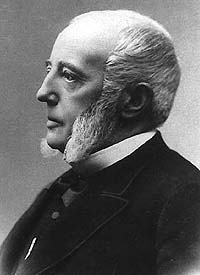 |
René Goblet René Goblet René Goblet was a French politician, Prime Minister of France for a period in 1886–1887.He was born at Aire-sur-la-Lys, Pas-de-Calais and was trained in law. Under the Second Empire, he helped found a Liberal journal, Le Progrès de la Somme, and in July 1871 he was sent by the département of the... |
• | 16 December 1886 | 30 May 1887 | Independent | |||
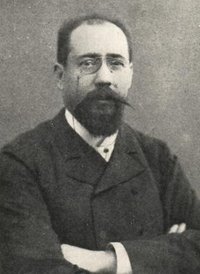 |
Maurice Rouvier Maurice Rouvier Maurice Rouvier was a French statesman.He was born in Aix-en-Provence, and spent his early career in business at Marseille. He supported Léon Gambetta's candidature there in 1867, and in 1870 he founded an anti-imperial journal, L'Egalité. Becoming secretary general of the prefecture of... |
1 | 30 May 1887 | 12 December 1887 | Opportunist Republican | |||
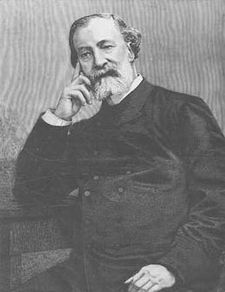 |
Pierre Tirard Pierre Tirard Pierre Emmanuel Tirard was a French politician.He was born to French parents in Geneva, Switzerland. After studying in his native town, Tirard became a civil engineer. After five years of government service he resigned to become a jewel merchant... |
1 | 12 December 1887 | 3 April 1888 | Independent | Marie François Sadi Carnot Marie François Sadi Carnot Marie François Sadi Carnot was a French statesman and the fourth president of the Third French Republic. He served as the President of France from 1887 until his assassination in 1894.-Early life:... (1887–1894) |
||
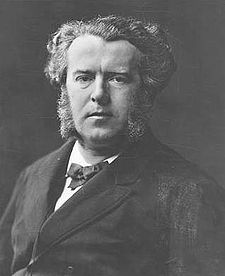 |
Charles Floquet Charles Floquet -Biography:He was born at Saint-Jean-Pied-de-Port . He studied law in Paris, and was called to the bar in 1851. The coup d'état of that year aroused the strenuous opposition of Floquet, who had, while yet a student, given proof of his republican sympathies by taking part in the fighting of 1848... |
• | 3 April 1888 | 22 February 1889 | Radical Republican | |||
 |
Pierre Tirard Pierre Tirard Pierre Emmanuel Tirard was a French politician.He was born to French parents in Geneva, Switzerland. After studying in his native town, Tirard became a civil engineer. After five years of government service he resigned to become a jewel merchant... |
2 | 22 February 1889 | 17 March 1890 | Independent | |||
 |
Charles de Freycinet Charles de Freycinet Charles Louis de Saulces de Freycinet was a French statesman and Prime Minister during the Third Republic; he belonged to the Opportunist Republicans faction. He was elected a member of the Academy of Sciences, and in 1890, the fourteen member to occupy seat the Académie française.-Early years:He... |
4 | 17 March 1890 | 27 February 1892 | Left Republican Democratic Republican Alliance The Democratic Republican Alliance was a French political party created in 1901 by followers of Léon Gambetta, such as Raymond Poincaré who would be president of the Council in the 1920s... |
V (1889 French legislative election, 1889 The 1889 general election was held on 22 September and 6 October 1889.-Parliamentary Groups:- Sources :*... ) |
||
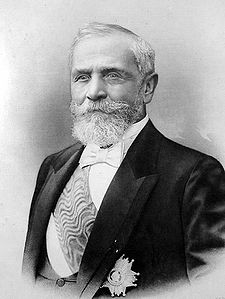 |
Émile Loubet Émile Loubet Émile François Loubet was a French politician and the 8th President of France.-Early life:He was born the son of a peasant proprietor and mayor of Marsanne . Admitted to the Parisian bar in 1862, he took his doctorate in law the next year... |
• | 27 February 1892 | 6 December 1892 | Left Republican Democratic Republican Alliance The Democratic Republican Alliance was a French political party created in 1901 by followers of Léon Gambetta, such as Raymond Poincaré who would be president of the Council in the 1920s... |
|||
 |
Alexandre Ribot Alexandre Ribot Alexandre-Félix-Joseph Ribot was a French politician, four times Prime Minister.-Biography:He was born in Saint-Omer, Pas-de-Calais.After a brilliant academic career at the University of Paris, where he was lauréat of the faculty of law, he rapidly made his mark at the bar... |
1 | 6 December 1892 | 4 April 1893 | Left Republican Democratic Republican Alliance The Democratic Republican Alliance was a French political party created in 1901 by followers of Léon Gambetta, such as Raymond Poincaré who would be president of the Council in the 1920s... |
|||
| 2 | ||||||||
 |
Charles Dupuy Charles Dupuy Charles Alexandre Dupuy was a French statesman, three times prime minister.-Biography:He was born in Le Puy-en-Velay, Haute-Loire, Auvergne, where his father was a minor official. After a period as a professor of philosophy in the provinces, he was appointed a school inspector, thus obtaining a... |
1 | 4 April 1893 | 3 December 1893 | Left Republican Democratic Republican Alliance The Democratic Republican Alliance was a French political party created in 1901 by followers of Léon Gambetta, such as Raymond Poincaré who would be president of the Council in the 1920s... |
|||
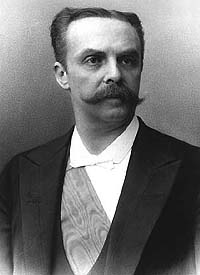 |
Jean Casimir-Perier Jean Casimir-Perier Jean Paul Pierre Casimir-Perier was a French politician, fifth president of the French Third Republic.-Biography:He was born in Paris, the son of Auguste Casimir-Perier and the grandson of Casimir Pierre Perier, premier of Louis Philippe... |
• | 3 December 1893 | 30 May 1894 | Left Republican Democratic Republican Alliance The Democratic Republican Alliance was a French political party created in 1901 by followers of Léon Gambetta, such as Raymond Poincaré who would be president of the Council in the 1920s... |
VI (1893 French legislative election, 1893 The 1893 general election was held on 20 August and 3 September 1893.-Parliamentary Groups:- Sources :*... ) |
||
 |
Charles Dupuy Charles Dupuy Charles Alexandre Dupuy was a French statesman, three times prime minister.-Biography:He was born in Le Puy-en-Velay, Haute-Loire, Auvergne, where his father was a minor official. After a period as a professor of philosophy in the provinces, he was appointed a school inspector, thus obtaining a... |
2 | 30 May 1894 | 26 January 1895 | Left Republican Democratic Republican Alliance The Democratic Republican Alliance was a French political party created in 1901 by followers of Léon Gambetta, such as Raymond Poincaré who would be president of the Council in the 1920s... |
|||
| 3 | Jean Casimir-Perier Jean Casimir-Perier Jean Paul Pierre Casimir-Perier was a French politician, fifth president of the French Third Republic.-Biography:He was born in Paris, the son of Auguste Casimir-Perier and the grandson of Casimir Pierre Perier, premier of Louis Philippe...  (1894–1895) |
|||||||
 |
Alexandre Ribot Alexandre Ribot Alexandre-Félix-Joseph Ribot was a French politician, four times Prime Minister.-Biography:He was born in Saint-Omer, Pas-de-Calais.After a brilliant academic career at the University of Paris, where he was lauréat of the faculty of law, he rapidly made his mark at the bar... |
3 | 26 January 1895 | 1 November 1895 | Left Republican Democratic Republican Alliance The Democratic Republican Alliance was a French political party created in 1901 by followers of Léon Gambetta, such as Raymond Poincaré who would be president of the Council in the 1920s... |
Félix Faure Félix Faure Félix François Faure was President of France from 1895 until his death.-Biography:Félix François Faure was born in Paris, the son of a small furniture maker... 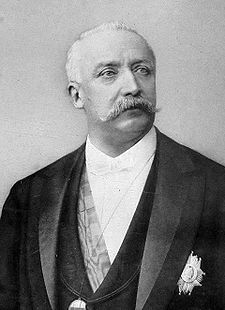 (1895–1899) |
||
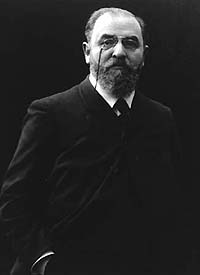 |
Léon Bourgeois Léon Bourgeois -Biography:He was born in Paris, and was trained in law. After holding a subordinate office in the department of public works, he became successively prefect of the Tarn and the Haute-Garonne , and then returned to Paris to enter the ministry of the interior... |
• | 1 November 1895 | 29 April 1896 | Radical Republican | |||
 |
Jules Méline Jules Méline Félix Jules Méline was a French statesman, prime minister from 1896 to 1898.-Biography:Méline was born at Remiremont. Having taken up law as his profession, he was chosen a deputy in 1872, and in 1879 he was for a short time under-secretary to the minister of the interior... |
• | 29 April 1896 | 28 June 1898 | Independent (centre-right) | |||
| Henri Brisson Henri Brisson Eugène Henri Brisson was a French statesman, Prime Minister of France for a period in 1885-1886 and again in 1898.-Biography:He was born at Bourges , and followed his father’s profession of advocate. Having made his mark in opposition during the last days of the empire, he was appointed... |
2 | 28 June 1898 | 1 November 1898 | Radical Republican | VII (1898 French legislative election, 1898 The 1898 general election was held on 8 and 22 May 1898.-Popular Vote:-Parliamentary Groups:- Sources :*... ) |
|||
 |
Charles Dupuy Charles Dupuy Charles Alexandre Dupuy was a French statesman, three times prime minister.-Biography:He was born in Le Puy-en-Velay, Haute-Loire, Auvergne, where his father was a minor official. After a period as a professor of philosophy in the provinces, he was appointed a school inspector, thus obtaining a... |
4 | 1 November 1898 | 22 June 1899 | Left Republican Democratic Republican Alliance The Democratic Republican Alliance was a French political party created in 1901 by followers of Léon Gambetta, such as Raymond Poincaré who would be president of the Council in the 1920s... |
|||
| 5 | Émile Loubet Émile Loubet Émile François Loubet was a French politician and the 8th President of France.-Early life:He was born the son of a peasant proprietor and mayor of Marsanne . Admitted to the Parisian bar in 1862, he took his doctorate in law the next year...  (1899–1906) |
|||||||
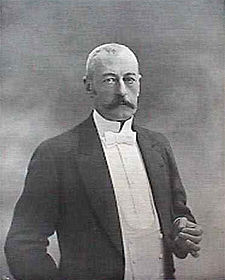 |
Pierre Waldeck-Rousseau | • | 22 June 1899 | 7 June 1902 | Democratic Republican Alliance Democratic Republican Alliance The Democratic Republican Alliance was a French political party created in 1901 by followers of Léon Gambetta, such as Raymond Poincaré who would be president of the Council in the 1920s... |
|||
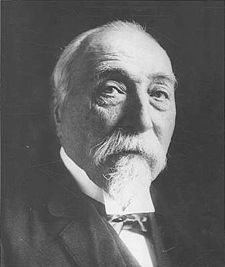 |
Émile Combes Émile Combes Émile Combes was a French statesman who led the Bloc des gauches's cabinet from June 1902 – January 1905.-Biography:Émile Combes was born in Roquecourbe, Tarn. He studied for the priesthood, but abandoned the idea before ordination. His anti-clericalism would later lead him into becoming a... |
• | 7 June 1902 | 24 January 1905 | Radical Socialist Party (Bloc des gauches Bloc des gauches The Bloc des gauches , aka Bloc républicain was a coalition of Republican political forces created during the French Third Republic in 1899 to contest the 1902 legislative elections... ) |
VIII (1902 French legislative election, 1902 Legislative elections were held in France on 27 April and 11 May 1902.This was a success for the Left Block which was composed by alliance between Socialists, Radicals, and the left-wing of the old Opportunist Republicans which merged after the Affaire Dreyfus crisis, to save the parlementary form... ) |
||
 |
Maurice Rouvier Maurice Rouvier Maurice Rouvier was a French statesman.He was born in Aix-en-Provence, and spent his early career in business at Marseille. He supported Léon Gambetta's candidature there in 1867, and in 1870 he founded an anti-imperial journal, L'Egalité. Becoming secretary general of the prefecture of... |
2 | 24 January 1905 | 12 March 1906 | Democratic Republican Alliance Democratic Republican Alliance The Democratic Republican Alliance was a French political party created in 1901 by followers of Léon Gambetta, such as Raymond Poincaré who would be president of the Council in the 1920s... |
|||
| 3 | Armand Fallières Armand Fallières Clément Armand Fallières was a French politician, president of the French republic from 1906 to 1913.He was born at Mézin in the département of Lot-et-Garonne, France, where his father was clerk of the peace...  (1906–1913) |
|||||||
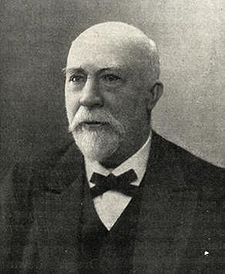 |
Ferdinand Sarrien Ferdinand Sarrien Jean Marie Ferdinand Sarrien was a French politician of the Third Republic. He was born in Bourbon-Lancy, Saône-et-Loire and died in Paris. He headed a cabinet supported by the Bloc des gauches parliamentary majority.... |
• | 12 March 1906 | 25 October 1906 | Radical Socialist Party | |||
| Georges Clemenceau Georges Clemenceau Georges Benjamin Clemenceau was a French statesman, physician and journalist. He served as the Prime Minister of France from 1906 to 1909, and again from 1917 to 1920. For nearly the final year of World War I he led France, and was one of the major voices behind the Treaty of Versailles at the... |
1 | 25 October 1906 | 24 July 1909 | Radical Socialist Party | IX (1906 French legislative election, 1906 The 1906 general election was held on 6 and 20 May 1906.-Popular Vote:-Parliamentary Groups:- Sources :*... ) |
|||
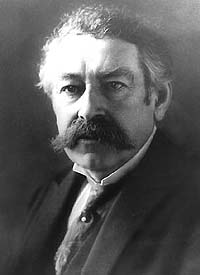 |
Aristide Briand Aristide Briand Aristide Briand was a French statesman who served eleven terms as Prime Minister of France during the French Third Republic and received the 1926 Nobel Peace Prize.- Early life :... |
1 | 24 July 1909 | 2 March 1911 | Republican-Socialist Party Republican-Socialist Party The Republican-Socialist Party was a French socialist political party during the French Third Republic, founded in 1911 and dissolved in 1934. It was founded by socialists who refused to join the SFIO founded in 1905. The PRS was a non-Marxist "reformist socialist" party located between the SFIO... |
|||
| 2 | ||||||||
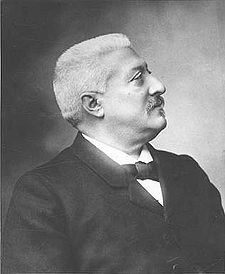 |
Ernest Monis Ernest Monis Antoine Emmanuel Ernest Monis was a French politician of the Third Republic, deputy of Gironde from 1885 to 1889 and then senator of the same department from 1891 to 1920... |
• | 2 March 1911 | 27 June 1911 | Radical Socialist Party | X (1910 French legislative election, 1910 -Popular Vote:-Parliamentary Groups:- Sources :*... ) |
||
| Joseph Caillaux Joseph Caillaux Joseph-Marie–Auguste Caillaux was a major French politician of the Third Republic. The leader of the Radicals, he favored a policy of conciliation with Germany during his premiership from 1911 to 1912, which led to the maintenance of the peace during the Second Moroccan Crisis of 1911... |
• | 27 June 1911 | 21 January 1912 | Radical Socialist Party | ||||
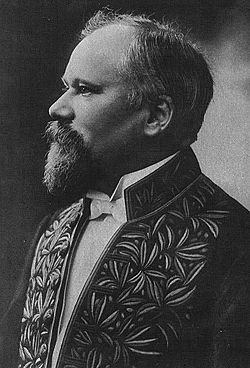 |
Raymond Poincaré Raymond Poincaré Raymond Poincaré was a French statesman who served as Prime Minister of France on five separate occasions and as President of France from 1913 to 1920. Poincaré was a conservative leader primarily committed to political and social stability... |
1 | 21 January 1912 | 21 January 1913 | Democratic Republican Party Democratic Republican Alliance The Democratic Republican Alliance was a French political party created in 1901 by followers of Léon Gambetta, such as Raymond Poincaré who would be president of the Council in the 1920s... |
|||
 |
Aristide Briand Aristide Briand Aristide Briand was a French statesman who served eleven terms as Prime Minister of France during the French Third Republic and received the 1926 Nobel Peace Prize.- Early life :... |
3 | 21 January 1913 | 22 March 1913 | Republican-Socialist Party Republican-Socialist Party The Republican-Socialist Party was a French socialist political party during the French Third Republic, founded in 1911 and dissolved in 1934. It was founded by socialists who refused to join the SFIO founded in 1905. The PRS was a non-Marxist "reformist socialist" party located between the SFIO... |
|||
| 4 | Raymond Poincaré Raymond Poincaré Raymond Poincaré was a French statesman who served as Prime Minister of France on five separate occasions and as President of France from 1913 to 1920. Poincaré was a conservative leader primarily committed to political and social stability...  (1913–1920) |
|||||||
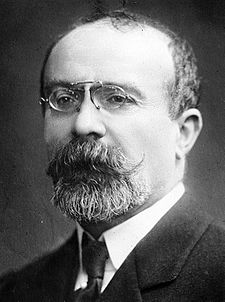 |
Louis Barthou Louis Barthou Jean Louis Barthou was a French politician of the Third Republic.-Early years:He was born in Oloron-Sainte-Marie, Pyrénées-Atlantiques, and served as Deputy from that constituency. He was an authority on trade union history and law. Barthou was Prime Minister in 1913, and held ministerial office... |
• | 22 March 1913 | 9 December 1913 | Democratic Republican Party Democratic Republican Alliance The Democratic Republican Alliance was a French political party created in 1901 by followers of Léon Gambetta, such as Raymond Poincaré who would be president of the Council in the 1920s... |
|||
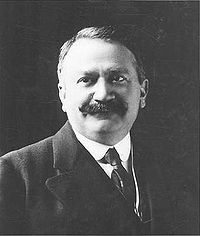 |
Gaston Doumergue Gaston Doumergue Pierre-Paul-Henri-Gaston Doumergue was a French politician of the Third Republic.Doumergue came from a Protestant family. Beginning as a Radical, he turned more towards the political right in his old age. He served as Prime Minister from 9 December 1913 to 2 June 1914... |
1 | 9 December 1913 | 9 June 1914 | Radical Socialist Party | |||
 |
Alexandre Ribot Alexandre Ribot Alexandre-Félix-Joseph Ribot was a French politician, four times Prime Minister.-Biography:He was born in Saint-Omer, Pas-de-Calais.After a brilliant academic career at the University of Paris, where he was lauréat of the faculty of law, he rapidly made his mark at the bar... |
4 | 9 June 1914 | 13 June 1914 | Democratic Republican Party Democratic Republican Alliance The Democratic Republican Alliance was a French political party created in 1901 by followers of Léon Gambetta, such as Raymond Poincaré who would be president of the Council in the 1920s... |
XI (1914 French legislative election, 1914 The 1914 general elections were held on 26 April and 10 May 1914, months before the outbreak of the First World War. The left won a landslide victory, though the entirety of the chambers, from Catholics to socialists united during World War I to form the Union sacrée.-Popular Vote:-Parliamentary... ) |
||
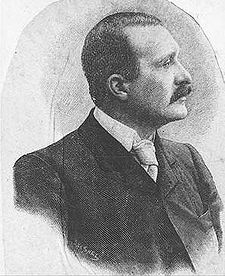 |
René Viviani René Viviani Jean Raphaël Adrien René Viviani was a French politician of the Third Republic, who served as Prime Minister for the first year of World War I. He was born in Sidi Bel Abbès, in French Algeria. In France he sought to protect the rights of socialists and trade union workers.-Biography:His... |
1 | 13 June 1914 | 29 October 1915 | Republican-Socialist Party Republican-Socialist Party The Republican-Socialist Party was a French socialist political party during the French Third Republic, founded in 1911 and dissolved in 1934. It was founded by socialists who refused to join the SFIO founded in 1905. The PRS was a non-Marxist "reformist socialist" party located between the SFIO... |
|||
| 2 | ||||||||
 |
Aristide Briand Aristide Briand Aristide Briand was a French statesman who served eleven terms as Prime Minister of France during the French Third Republic and received the 1926 Nobel Peace Prize.- Early life :... |
5 | 29 October 1915 | 20 March 1917 | Republican-Socialist Party Republican-Socialist Party The Republican-Socialist Party was a French socialist political party during the French Third Republic, founded in 1911 and dissolved in 1934. It was founded by socialists who refused to join the SFIO founded in 1905. The PRS was a non-Marxist "reformist socialist" party located between the SFIO... |
|||
| 6 | ||||||||
 |
Alexandre Ribot Alexandre Ribot Alexandre-Félix-Joseph Ribot was a French politician, four times Prime Minister.-Biography:He was born in Saint-Omer, Pas-de-Calais.After a brilliant academic career at the University of Paris, where he was lauréat of the faculty of law, he rapidly made his mark at the bar... |
5 | 20 March 1917 | 12 September 1917 | Democratic Republican Party Democratic Republican Alliance The Democratic Republican Alliance was a French political party created in 1901 by followers of Léon Gambetta, such as Raymond Poincaré who would be president of the Council in the 1920s... |
|||
| Paul Painlevé Paul Painlevé Paul Painlevé was a French mathematician and politician. He served twice as Prime Minister of the Third Republic: 12 September – 13 November 1917 and 17 April – 22 November 1925.-Early life:Painlevé was born in Paris.... |
1 | 12 September 1917 | 16 November 1917 | Republican-Socialist Party Republican-Socialist Party The Republican-Socialist Party was a French socialist political party during the French Third Republic, founded in 1911 and dissolved in 1934. It was founded by socialists who refused to join the SFIO founded in 1905. The PRS was a non-Marxist "reformist socialist" party located between the SFIO... |
||||
| Georges Clemenceau Georges Clemenceau Georges Benjamin Clemenceau was a French statesman, physician and journalist. He served as the Prime Minister of France from 1906 to 1909, and again from 1917 to 1920. For nearly the final year of World War I he led France, and was one of the major voices behind the Treaty of Versailles at the... |
2 | 16 November 1917 | 20 January 1920 | Radical Socialist Party | ||||
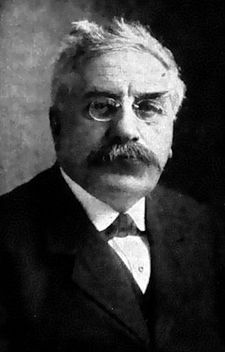 |
Alexandre Millerand Alexandre Millerand Alexandre Millerand was a French socialist politician. He was President of France from 23 September 1920 to 11 June 1924 and Prime Minister of France 20 January to 23 September 1920... |
1 | 20 January 1920 | 24 September 1920 | Independent (moderate) (National Bloc National Bloc (France) The National Bloc was a center-right coalition in France which was in power from 1919 to 1924.- Elections of 1919 :Made up primarily of conservative right wing parties, such as the Fédération républicaine, Alliance démocratique, and Action libérale, the coalition had the support of various radical... ) |
XII (1919 French legislative election, 1919 The 1919 legislative election, the first election held after World War I, was held on 16 and 30 November 1919.Proportional representation by department replaced the Two-round system by arrondissements in use since 1889... ) |
||
| 2 | Paul Deschanel Paul Deschanel Paul Eugène Louis Deschanel was a French statesman. He served as President of France from 18 February 1920 to 21 September 1920.-Biography:... (1920) |
|||||||
| Georges Leygues Georges Leygues Georges Leygues was a French politician of the Third Republic. During his time as Minister of Marine he worked with the navy's chief of staff Henri Salaun in unsuccessful attempts to gain naval re-armament priority for government funding over army rearmament such as the Maginot Line.He was born... |
• | 24 September 1920 | 16 January 1921 | Democratic Republican Party Democratic Republican Alliance The Democratic Republican Alliance was a French political party created in 1901 by followers of Léon Gambetta, such as Raymond Poincaré who would be president of the Council in the 1920s... (National Bloc National Bloc (France) The National Bloc was a center-right coalition in France which was in power from 1919 to 1924.- Elections of 1919 :Made up primarily of conservative right wing parties, such as the Fédération républicaine, Alliance démocratique, and Action libérale, the coalition had the support of various radical... ) |
Alexandre Millerand Alexandre Millerand Alexandre Millerand was a French socialist politician. He was President of France from 23 September 1920 to 11 June 1924 and Prime Minister of France 20 January to 23 September 1920...  (1920–1924) |
|||
 |
Aristide Briand Aristide Briand Aristide Briand was a French statesman who served eleven terms as Prime Minister of France during the French Third Republic and received the 1926 Nobel Peace Prize.- Early life :... |
7 | 16 January 1921 | 15 January 1922 | Republican-Socialist Party Republican-Socialist Party The Republican-Socialist Party was a French socialist political party during the French Third Republic, founded in 1911 and dissolved in 1934. It was founded by socialists who refused to join the SFIO founded in 1905. The PRS was a non-Marxist "reformist socialist" party located between the SFIO... |
|||
 |
Raymond Poincaré Raymond Poincaré Raymond Poincaré was a French statesman who served as Prime Minister of France on five separate occasions and as President of France from 1913 to 1920. Poincaré was a conservative leader primarily committed to political and social stability... |
2 | 15 January 1922 | 8 June 1924 | Democratic Alliance Democratic Republican Alliance The Democratic Republican Alliance was a French political party created in 1901 by followers of Léon Gambetta, such as Raymond Poincaré who would be president of the Council in the 1920s... (National Bloc National Bloc (France) The National Bloc was a center-right coalition in France which was in power from 1919 to 1924.- Elections of 1919 :Made up primarily of conservative right wing parties, such as the Fédération républicaine, Alliance démocratique, and Action libérale, the coalition had the support of various radical... ) |
|||
| 3 | ||||||||
 |
Frédéric François-Marsal Frédéric François-Marsal Frédéric François-Marsal was a French Politician of the Third Republic, who served briefly as Prime Minister in 1924. Due to his premiership he also served for two days as the Acting President of the French Republic between resignation of Alexandre Millerand and election of Gaston... |
• | 8 June 1924 | 15 June 1924 | Republican Federation Republican Federation The Republican Federation was the largest conservative party during the French Third Republic, gathering together the liberal Orleanists rallied to the Republic. Founded in November 1903, it rivalized with the more secular and centrist Alliance démocratique... (National Bloc National Bloc (France) The National Bloc was a center-right coalition in France which was in power from 1919 to 1924.- Elections of 1919 :Made up primarily of conservative right wing parties, such as the Fédération républicaine, Alliance démocratique, and Action libérale, the coalition had the support of various radical... ) |
|||
| Édouard Herriot Édouard Herriot Édouard Marie Herriot was a French Radical politician of the Third Republic who served three times as Prime Minister and for many years as President of the Chamber of Deputies.... |
1 | 15 June 1924 | 17 April 1925 | Radical Socialist Party (Cartel des Gauches Cartel des Gauches The Cartel des gauches was the name of the governmental alliance between the Radical-Socialist Party and the socialist French Section of the Workers' International after World War I , which lasted until the end of the Popular Front . The Cartel des gauches twice won general elections, in 1924 and... ) |
XIII (1924) | Gaston Doumergue Gaston Doumergue Pierre-Paul-Henri-Gaston Doumergue was a French politician of the Third Republic.Doumergue came from a Protestant family. Beginning as a Radical, he turned more towards the political right in his old age. He served as Prime Minister from 9 December 1913 to 2 June 1914...  (1924–1931) |
||
| Paul Painlevé Paul Painlevé Paul Painlevé was a French mathematician and politician. He served twice as Prime Minister of the Third Republic: 12 September – 13 November 1917 and 17 April – 22 November 1925.-Early life:Painlevé was born in Paris.... |
2 | 17 April 1925 | 28 November 1925 | Republican-Socialist Party Republican-Socialist Party The Republican-Socialist Party was a French socialist political party during the French Third Republic, founded in 1911 and dissolved in 1934. It was founded by socialists who refused to join the SFIO founded in 1905. The PRS was a non-Marxist "reformist socialist" party located between the SFIO... (Cartel des Gauches Cartel des Gauches The Cartel des gauches was the name of the governmental alliance between the Radical-Socialist Party and the socialist French Section of the Workers' International after World War I , which lasted until the end of the Popular Front . The Cartel des gauches twice won general elections, in 1924 and... ) |
||||
| 3 | ||||||||
 |
Aristide Briand Aristide Briand Aristide Briand was a French statesman who served eleven terms as Prime Minister of France during the French Third Republic and received the 1926 Nobel Peace Prize.- Early life :... |
8 | 28 November 1925 | 20 July 1926 | Republican-Socialist Party Republican-Socialist Party The Republican-Socialist Party was a French socialist political party during the French Third Republic, founded in 1911 and dissolved in 1934. It was founded by socialists who refused to join the SFIO founded in 1905. The PRS was a non-Marxist "reformist socialist" party located between the SFIO... (Cartel des Gauches Cartel des Gauches The Cartel des gauches was the name of the governmental alliance between the Radical-Socialist Party and the socialist French Section of the Workers' International after World War I , which lasted until the end of the Popular Front . The Cartel des gauches twice won general elections, in 1924 and... ) |
|||
| 9 | ||||||||
| 10 | ||||||||
| Édouard Herriot Édouard Herriot Édouard Marie Herriot was a French Radical politician of the Third Republic who served three times as Prime Minister and for many years as President of the Chamber of Deputies.... |
2 | 20 July 1926 | 23 July 1926 | Radical Socialist Party (Cartel des Gauches Cartel des Gauches The Cartel des gauches was the name of the governmental alliance between the Radical-Socialist Party and the socialist French Section of the Workers' International after World War I , which lasted until the end of the Popular Front . The Cartel des gauches twice won general elections, in 1924 and... ) |
||||
 |
Raymond Poincaré Raymond Poincaré Raymond Poincaré was a French statesman who served as Prime Minister of France on five separate occasions and as President of France from 1913 to 1920. Poincaré was a conservative leader primarily committed to political and social stability... |
4 | 23 July 1926 | 29 July 1929 | Democratic Alliance Democratic Republican Alliance The Democratic Republican Alliance was a French political party created in 1901 by followers of Léon Gambetta, such as Raymond Poincaré who would be president of the Council in the 1920s... (National Union) |
|||
| 5 | ||||||||
 |
Aristide Briand Aristide Briand Aristide Briand was a French statesman who served eleven terms as Prime Minister of France during the French Third Republic and received the 1926 Nobel Peace Prize.- Early life :... |
11 | 29 July 1929 | 2 November 1929 | Republican-Socialist Party Republican-Socialist Party The Republican-Socialist Party was a French socialist political party during the French Third Republic, founded in 1911 and dissolved in 1934. It was founded by socialists who refused to join the SFIO founded in 1905. The PRS was a non-Marxist "reformist socialist" party located between the SFIO... |
XIV (1928 French legislative election, 1928 Legislative elections in France to elect the 14th legislature of the French Third Republic were held on 22 and 29 April 1928.-Popular Vote:-Parliamentary Groups:... ) |
||
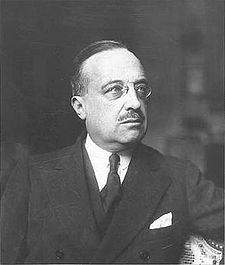 |
André Tardieu André Tardieu André Pierre Gabriel Amédée Tardieu was three times Prime Minister of France and a dominant figure of French political life in 1929-1932.-Biography:... |
1 | 2 November 1929 | 21 February 1930 | Democratic Alliance Democratic Republican Alliance The Democratic Republican Alliance was a French political party created in 1901 by followers of Léon Gambetta, such as Raymond Poincaré who would be president of the Council in the 1920s... |
|||
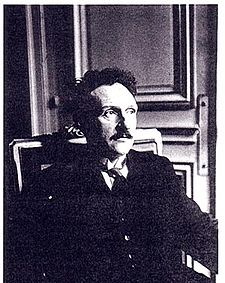 |
Camille Chautemps Camille Chautemps Camille Chautemps was a French Radical politician of the Third Republic, three times President of the Council .-Career:Described as "intellectually bereft", Chautemps nevertheless entered politics and became Mayor of Tours in 1912, and a Radical deputy in 1919... |
1 | 21 February 1930 | 2 March 1930 | Radical Socialist Party | |||
 |
André Tardieu André Tardieu André Pierre Gabriel Amédée Tardieu was three times Prime Minister of France and a dominant figure of French political life in 1929-1932.-Biography:... |
2 | 2 March 1930 | 13 December 1930 | Democratic Alliance Democratic Republican Alliance The Democratic Republican Alliance was a French political party created in 1901 by followers of Léon Gambetta, such as Raymond Poincaré who would be president of the Council in the 1920s... |
|||
| Théodore Steeg Théodore Steeg Théodore Steeg was a French politician of the Third Republic, deputy of the Seine from 1906 to 1914 and senator of the same department from 1914 to 1940.... |
• | 13 December 1930 | 27 January 1931 | Radical Socialist Party | ||||
| Pierre Laval Pierre Laval Pierre Laval was a French politician. He was four times President of the council of ministers of the Third Republic, twice consecutively. Following France's Armistice with Germany in 1940, he served twice in the Vichy Regime as head of government, signing orders permitting the deportation of... |
1 | 27 January 1931 | 20 February 1932 | Independent (conservative) National Bloc (France) The National Bloc was a center-right coalition in France which was in power from 1919 to 1924.- Elections of 1919 :Made up primarily of conservative right wing parties, such as the Fédération républicaine, Alliance démocratique, and Action libérale, the coalition had the support of various radical... |
||||
| 2 | Paul Doumer Paul Doumer Joseph Athanase Paul Doumer, commonly known as Paul Doumer was the President of France from 13 June 1931 until his assassination.-Biography:... 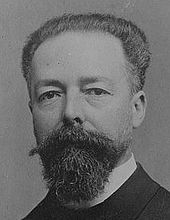 (1931–1932) |
|||||||
| 3 | ||||||||
 |
André Tardieu André Tardieu André Pierre Gabriel Amédée Tardieu was three times Prime Minister of France and a dominant figure of French political life in 1929-1932.-Biography:... |
3 | 20 February 1932 | 3 June 1932 | Democratic Alliance Democratic Republican Alliance The Democratic Republican Alliance was a French political party created in 1901 by followers of Léon Gambetta, such as Raymond Poincaré who would be president of the Council in the 1920s... |
|||
| Édouard Herriot Édouard Herriot Édouard Marie Herriot was a French Radical politician of the Third Republic who served three times as Prime Minister and for many years as President of the Chamber of Deputies.... |
3 | 3 June 1932 | 18 December 1932 | Radical Socialist Party (Cartel des Gauches Cartel des Gauches The Cartel des gauches was the name of the governmental alliance between the Radical-Socialist Party and the socialist French Section of the Workers' International after World War I , which lasted until the end of the Popular Front . The Cartel des gauches twice won general elections, in 1924 and... ) |
XV (1932) | Albert Lebrun Albert Lebrun Albert François Lebrun was a French politician, President of France from 1932 to 1940. He was the last president of the Third Republic. He was a member of the center-right Democratic Republican Alliance .-Biography:... 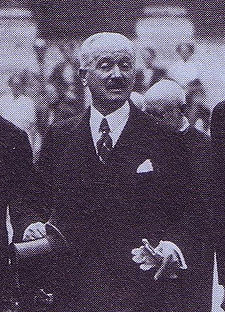 (1932–1940) |
||
| Joseph Paul-Boncour Joseph Paul-Boncour Augustin Alfred Joseph Paul-Boncour was a French politician of the Third Republic.-Career:Born in Saint-Aignan, Loir-et-Cher, Paul-Boncour received a law degree from the University of Paris and became active in the labor movement, organizing the legal council of the Bourses du Travail... |
• | 18 December 1932 | 31 January 1933 | Republican-Socialist Party Republican-Socialist Party The Republican-Socialist Party was a French socialist political party during the French Third Republic, founded in 1911 and dissolved in 1934. It was founded by socialists who refused to join the SFIO founded in 1905. The PRS was a non-Marxist "reformist socialist" party located between the SFIO... (Cartel des Gauches Cartel des Gauches The Cartel des gauches was the name of the governmental alliance between the Radical-Socialist Party and the socialist French Section of the Workers' International after World War I , which lasted until the end of the Popular Front . The Cartel des gauches twice won general elections, in 1924 and... ) |
||||
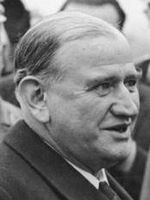 |
Édouard Daladier Édouard Daladier Édouard Daladier was a French Radical politician and the Prime Minister of France at the start of the Second World War.-Career:Daladier was born in Carpentras, Vaucluse. Later, he would become known to many as "the bull of Vaucluse" because of his thick neck and large shoulders and determined... |
1 | 31 January 1933 | 26 October 1933 | Radical Socialist Party (Cartel des Gauches Cartel des Gauches The Cartel des gauches was the name of the governmental alliance between the Radical-Socialist Party and the socialist French Section of the Workers' International after World War I , which lasted until the end of the Popular Front . The Cartel des gauches twice won general elections, in 1924 and... ) |
|||
| Albert Sarraut Albert Sarraut Albert-Pierre Sarraut was a French Radical politician, twice Prime Minister during the Third Republic.Sarraut was born in Bordeaux, Gironde, France.He was Governor-General of French Indochina, from 1912 to 1919.... |
1 | 26 October 1933 | 26 November 1933 | Radical Socialist Party (Cartel des Gauches Cartel des Gauches The Cartel des gauches was the name of the governmental alliance between the Radical-Socialist Party and the socialist French Section of the Workers' International after World War I , which lasted until the end of the Popular Front . The Cartel des gauches twice won general elections, in 1924 and... ) |
||||
 |
Camille Chautemps Camille Chautemps Camille Chautemps was a French Radical politician of the Third Republic, three times President of the Council .-Career:Described as "intellectually bereft", Chautemps nevertheless entered politics and became Mayor of Tours in 1912, and a Radical deputy in 1919... |
2 | 26 November 1933 | 30 January 1934 | Radical Socialist Party (Cartel des Gauches Cartel des Gauches The Cartel des gauches was the name of the governmental alliance between the Radical-Socialist Party and the socialist French Section of the Workers' International after World War I , which lasted until the end of the Popular Front . The Cartel des gauches twice won general elections, in 1924 and... ) |
|||
 |
Édouard Daladier Édouard Daladier Édouard Daladier was a French Radical politician and the Prime Minister of France at the start of the Second World War.-Career:Daladier was born in Carpentras, Vaucluse. Later, he would become known to many as "the bull of Vaucluse" because of his thick neck and large shoulders and determined... |
2 | 30 January 1934 | 9 February 1934 | Radical Socialist Party (Cartel des Gauches Cartel des Gauches The Cartel des gauches was the name of the governmental alliance between the Radical-Socialist Party and the socialist French Section of the Workers' International after World War I , which lasted until the end of the Popular Front . The Cartel des gauches twice won general elections, in 1924 and... ) |
|||
 |
Gaston Doumergue Gaston Doumergue Pierre-Paul-Henri-Gaston Doumergue was a French politician of the Third Republic.Doumergue came from a Protestant family. Beginning as a Radical, he turned more towards the political right in his old age. He served as Prime Minister from 9 December 1913 to 2 June 1914... |
2 | 9 February 1934 | 8 November 1934 | Radical Socialist Party (Government of National Union) |
|||
| Pierre-Étienne Flandin | 1 | 8 November 1934 | 1 June 1935 | Democratic Alliance Democratic Republican Alliance The Democratic Republican Alliance was a French political party created in 1901 by followers of Léon Gambetta, such as Raymond Poincaré who would be president of the Council in the 1920s... |
||||
| Fernand Bouisson Fernand Bouisson Fernand Bouisson was a French politician of the Third Republic, who served as President of the Chamber of Deputies from 1927 to 1936 and briefly as Prime Minister in 1935.-Bouisson's Ministry, 1–7 June 1935:... |
• | 1 June 1935 | 7 June 1935 | Republican-Socialist Party Republican-Socialist Party The Republican-Socialist Party was a French socialist political party during the French Third Republic, founded in 1911 and dissolved in 1934. It was founded by socialists who refused to join the SFIO founded in 1905. The PRS was a non-Marxist "reformist socialist" party located between the SFIO... |
||||
| Pierre Laval Pierre Laval Pierre Laval was a French politician. He was four times President of the council of ministers of the Third Republic, twice consecutively. Following France's Armistice with Germany in 1940, he served twice in the Vichy Regime as head of government, signing orders permitting the deportation of... |
4 | 7 June 1935 | 24 January 1936 | Independent (conservative) National Bloc (France) The National Bloc was a center-right coalition in France which was in power from 1919 to 1924.- Elections of 1919 :Made up primarily of conservative right wing parties, such as the Fédération républicaine, Alliance démocratique, and Action libérale, the coalition had the support of various radical... |
||||
| Albert Sarraut Albert Sarraut Albert-Pierre Sarraut was a French Radical politician, twice Prime Minister during the Third Republic.Sarraut was born in Bordeaux, Gironde, France.He was Governor-General of French Indochina, from 1912 to 1919.... |
2 | 24 January 1936 | 4 June 1936 | Radical Socialist Party | ||||
| Léon Blum Léon Blum André Léon Blum was a French politician, usually identified with the moderate left, and three times the Prime Minister of France.-First political experiences:... |
1 | 4 June 1936 | 22 June 1937 | French Section of the Workers' International (Popular Front Popular Front (France) The Popular Front was an alliance of left-wing movements, including the French Communist Party , the French Section of the Workers' International and the Radical and Socialist Party, during the interwar period... ) |
XVI (1936 French legislative election, 1936 French legislative elections to elect the 16th legislature of the French Third Republic were held on 26 April and 3 May 1936. This was the last legislature of the Third Republic and the last election before the Second World War. The number of candidates set a record, with 4,807 people vying for 618... ) |
|||
 |
Camille Chautemps Camille Chautemps Camille Chautemps was a French Radical politician of the Third Republic, three times President of the Council .-Career:Described as "intellectually bereft", Chautemps nevertheless entered politics and became Mayor of Tours in 1912, and a Radical deputy in 1919... |
3 | 22 June 1937 | 13 March 1938 | Radical Socialist Party (Popular Front Popular Front (France) The Popular Front was an alliance of left-wing movements, including the French Communist Party , the French Section of the Workers' International and the Radical and Socialist Party, during the interwar period... ) |
|||
| 4 | ||||||||
| Léon Blum Léon Blum André Léon Blum was a French politician, usually identified with the moderate left, and three times the Prime Minister of France.-First political experiences:... |
2 | 13 March 1938 | 10 April 1938 | French Section of the Workers' International (Popular Front Popular Front (France) The Popular Front was an alliance of left-wing movements, including the French Communist Party , the French Section of the Workers' International and the Radical and Socialist Party, during the interwar period... ) |
||||
 |
Édouard Daladier Édouard Daladier Édouard Daladier was a French Radical politician and the Prime Minister of France at the start of the Second World War.-Career:Daladier was born in Carpentras, Vaucluse. Later, he would become known to many as "the bull of Vaucluse" because of his thick neck and large shoulders and determined... |
3 | 10 April 1938 | 21 March 1940 | Radical Socialist Party | |||
| 4 | ||||||||
| 5 | ||||||||
| Paul Reynaud Paul Reynaud Paul Reynaud was a French politician and lawyer prominent in the interwar period, noted for his stances on economic liberalism and militant opposition to Germany. He was the penultimate Prime Minister of the Third Republic and vice-president of the Democratic Republican Alliance center-right... |
• | 21 March 1940 | 16 June 1940 | Democratic Alliance Democratic Republican Alliance The Democratic Republican Alliance was a French political party created in 1901 by followers of Léon Gambetta, such as Raymond Poincaré who would be president of the Council in the 1920s... |
||||
| Philippe Pétain Philippe Pétain Henri Philippe Benoni Omer Joseph Pétain , generally known as Philippe Pétain or Marshal Pétain , was a French general who reached the distinction of Marshal of France, and was later Chief of State of Vichy France , from 1940 to 1944... |
• | 16 June 1940 | 11 July 1940 | Military Military A military is an organization authorized by its greater society to use lethal force, usually including use of weapons, in defending its country by combating actual or perceived threats. The military may have additional functions of use to its greater society, such as advancing a political agenda e.g... |
||||
Presidents and Vice-Presidents of the Council of Ministers
Political Party:| Portrait | President | Vice-President | Govt. | Took office | Left office | |
|---|---|---|---|---|---|---|
| Philippe Pétain Philippe Pétain Henri Philippe Benoni Omer Joseph Pétain , generally known as Philippe Pétain or Marshal Pétain , was a French general who reached the distinction of Marshal of France, and was later Chief of State of Vichy France , from 1940 to 1944... |
Pierre Laval Pierre Laval Pierre Laval was a French politician. He was four times President of the council of ministers of the Third Republic, twice consecutively. Following France's Armistice with Germany in 1940, he served twice in the Vichy Regime as head of government, signing orders permitting the deportation of... |
5 | 11 July 1940 | 13 December 1940 | ||
| Pierre-Étienne Flandin | 2 | 13 December 1940 | 9 February 1941 | |||
| François Darlan François Darlan Jean Louis Xavier François Darlan was a French naval officer. His great-grandfather was killed at the Battle of Trafalgar... |
• | 9 February 1941 | 18 April 1942 | |||
| Pierre Laval Pierre Laval Pierre Laval was a French politician. He was four times President of the council of ministers of the Third Republic, twice consecutively. Following France's Armistice with Germany in 1940, he served twice in the Vichy Regime as head of government, signing orders permitting the deportation of... |
position abolished | 6 | 18 April 1942 | 17 August 1944 | ||
As Pétain was both Head of State and nominal Head of Government between 1940 and 1942, the de facto
De facto
De facto is a Latin expression that means "concerning fact." In law, it often means "in practice but not necessarily ordained by law" or "in practice or actuality, but not officially established." It is commonly used in contrast to de jure when referring to matters of law, governance, or...
Head of Government of Vichy France
Vichy France
Vichy France, Vichy Regime, or Vichy Government, are common terms used to describe the government of France that collaborated with the Axis powers from July 1940 to August 1944. This government succeeded the Third Republic and preceded the Provisional Government of the French Republic...
, between 1940 and 1942, was known as Vice-President of the Council. Pierre Laval
Pierre Laval
Pierre Laval was a French politician. He was four times President of the council of ministers of the Third Republic, twice consecutively. Following France's Armistice with Germany in 1940, he served twice in the Vichy Regime as head of government, signing orders permitting the deportation of...
(July–December 1940), Pierre-Étienne Flandin (1940–1941) and François Darlan
François Darlan
Jean Louis Xavier François Darlan was a French naval officer. His great-grandfather was killed at the Battle of Trafalgar...
(1941–1942) served successively as Vice-President of the Council. The post of Vice-President was abolished in 1942 when Laval returned to power, and assumed the nominal position of President of the Council.
Chairmen of the Provisional Government
Political Party:| Portrait | Name | Took office | Left office | Political Party | Legislature (Election) |
||
|---|---|---|---|---|---|---|---|
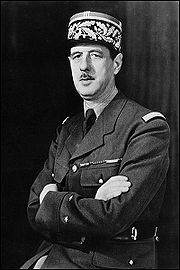 |
Charles de Gaulle Charles de Gaulle Charles André Joseph Marie de Gaulle was a French general and statesman who led the Free French Forces during World War II. He later founded the French Fifth Republic in 1958 and served as its first President from 1959 to 1969.... |
1 | 20 August 1944 | 26 January 1946 | Independent Independent (politician) In politics, an independent or non-party politician is an individual not affiliated to any political party. Independents may hold a centrist viewpoint between those of major political parties, a viewpoint more extreme than any major party, or they may have a viewpoint based on issues that they do... |
Provisional | |
| 2 | I (1945 French legislative election, 1945 A legislative election was held in France on 21 October 1945 to elect a constituent assembly to draft a constitution for a Fourth French Republic. 79.83% of voters participated. Women and soldiers were allowed to vote... ) |
||||||
 |
Félix Gouin Félix Gouin Félix Gouin was a French Socialist politician, member of the French Section of the Workers' International .-Personal life:Félix Gouin was born in Peypin, Bouches-du-Rhône, the son of school teachers... |
• | 26 January 1946 | 24 June 1946 | French Section of the Workers' International | ||
 |
Georges Bidault Georges Bidault Georges-Augustin Bidault was a French politician. During World War II, he was active in the French Resistance. After the war, he served as foreign minister and prime minister on several occasions before he joined the Organisation armée secrète.-Early life:... |
1 | 24 June 1946 | 28 November 1946 | Popular Republican Movement Popular Republican Movement The Popular Republican Movement was a French Christian democratic party of the Fourth Republic... |
II (June 1946 French legislative election, June 1946 Legislative elections were held in France on 2 June 1946 to elect the second post-war National Assembly designated to prepare a new Constitution... ) |
|
 |
Vincent Auriol Vincent Auriol Vincent Jules Auriol was a French politician who served as the first President of the Fourth Republic from 1947 to 1954. He also served as interim President of the Provisional Government from November to December 1946, making him one of only three people who were heads of state of the French... (interim) |
– | 28 November 1946 | 16 December 1946 | French Section of the Workers' International | IV Rep. I (Nov. 1946 French legislative election, November 1946 Legislative election was held in France on 10 November 1946 to elect the first National Assembly of the Fourth Republic. The electoral system used was proportional representation.... ) |
|
| Léon Blum Léon Blum André Léon Blum was a French politician, usually identified with the moderate left, and three times the Prime Minister of France.-First political experiences:... |
3 | 16 December 1946 | 22 January 1947 | French Section of the Workers' International | |||
Presidents of the Council of Ministers
Political Party:| Portrait | Name | Took office | Left office | Political Party (Coalition) | Legislature (Election) |
President (Term) |
||
|---|---|---|---|---|---|---|---|---|
| Paul Ramadier Paul Ramadier Paul Ramadier was a prominent French politician of the Third and Fourth Republics. Mayor of Decazeville starting in 1919, he served as the first Prime Minister of the Fourth Republic in 1947. On 10 July 1940, he voted against the granting of the full powers to Marshal Philippe Pétain, who... |
1 | 22 January 1947 | 24 November 1947 | French Section of the Workers' International (Tripartism Three-parties The Three-Parties Alliance was a coalition which governed in France from 1944 to 1947, and was composed of the French Communist Party , the French Section of the Workers' International and the Christian Democrat Popular Republican Movement , which to begin with contained the regrouped Gaullists... ) |
I (Nov. 1946 French legislative election, November 1946 Legislative election was held in France on 10 November 1946 to elect the first National Assembly of the Fourth Republic. The electoral system used was proportional representation.... ) |
Vincent Auriol Vincent Auriol Vincent Jules Auriol was a French politician who served as the first President of the Fourth Republic from 1947 to 1954. He also served as interim President of the Provisional Government from November to December 1946, making him one of only three people who were heads of state of the French...  (1947–1954) |
||
| 2 | ||||||||
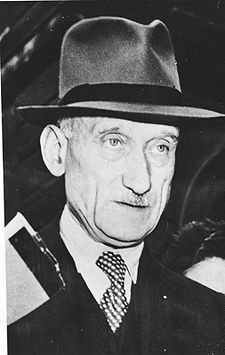 |
Robert Schuman Robert Schuman Robert Schuman was a noted Luxembourgish-born French statesman. Schuman was a Christian Democrat and an independent political thinker and activist... |
1 | 24 November 1947 | 24 July 1948 | Popular Republican Movement Popular Republican Movement The Popular Republican Movement was a French Christian democratic party of the Fourth Republic... (Third Force Third Force (France) The Third Force was a French coalition during the Fourth Republic which gathered the French Section of the Workers' International party, the Democratic and Socialist Union of the Resistance centre-right party, the Radicals, the Christian democrat Popular Republican Movement and other centrist... ) |
|||
 |
André Marie André Marie André Marie was a French Radical politician who served as Prime Minister during the Fourth Republic in 1948.-Biography:... |
• | 24 July 1948 | 2 September 1948 | Radical Socialist Party (Third Force Third Force (France) The Third Force was a French coalition during the Fourth Republic which gathered the French Section of the Workers' International party, the Democratic and Socialist Union of the Resistance centre-right party, the Radicals, the Christian democrat Popular Republican Movement and other centrist... ) |
|||
 |
Robert Schuman Robert Schuman Robert Schuman was a noted Luxembourgish-born French statesman. Schuman was a Christian Democrat and an independent political thinker and activist... |
2 | 2 September 1948 | 11 September 1948 | Popular Republican Movement Popular Republican Movement The Popular Republican Movement was a French Christian democratic party of the Fourth Republic... (Third Force Third Force (France) The Third Force was a French coalition during the Fourth Republic which gathered the French Section of the Workers' International party, the Democratic and Socialist Union of the Resistance centre-right party, the Radicals, the Christian democrat Popular Republican Movement and other centrist... ) |
|||
| Henri Queuille Henri Queuille Henri Queuille was a French Radical politician prominent in the Third and Fourth Republics. After World War II, he served three times as Prime Minister.He was the son of a noblewoman.-First ministry :... |
1 | 11 September 1948 | 28 October 1949 | Radical Socialist Party (Third Force Third Force (France) The Third Force was a French coalition during the Fourth Republic which gathered the French Section of the Workers' International party, the Democratic and Socialist Union of the Resistance centre-right party, the Radicals, the Christian democrat Popular Republican Movement and other centrist... ) |
||||
 |
Georges Bidault Georges Bidault Georges-Augustin Bidault was a French politician. During World War II, he was active in the French Resistance. After the war, he served as foreign minister and prime minister on several occasions before he joined the Organisation armée secrète.-Early life:... |
2 | 28 October 1949 | 2 July 1950 | Popular Republican Movement Popular Republican Movement The Popular Republican Movement was a French Christian democratic party of the Fourth Republic... (Third Force Third Force (France) The Third Force was a French coalition during the Fourth Republic which gathered the French Section of the Workers' International party, the Democratic and Socialist Union of the Resistance centre-right party, the Radicals, the Christian democrat Popular Republican Movement and other centrist... ) |
|||
| 3 | ||||||||
| Henri Queuille Henri Queuille Henri Queuille was a French Radical politician prominent in the Third and Fourth Republics. After World War II, he served three times as Prime Minister.He was the son of a noblewoman.-First ministry :... |
2 | 2 July 1950 | 12 July 1950 | Radical Socialist Party (Third Force Third Force (France) The Third Force was a French coalition during the Fourth Republic which gathered the French Section of the Workers' International party, the Democratic and Socialist Union of the Resistance centre-right party, the Radicals, the Christian democrat Popular Republican Movement and other centrist... ) |
||||
 |
René Pleven René Pleven René Pléven was a notable French politician of the Fourth Republic. A member of the Free French, he helped found the Democratic and Socialist Union of the Resistance , a political party that was meant to be a successor to the wartime Resistance movement... |
1 | 12 July 1950 | 10 March 1951 | Democratic and Socialist Union of the Resistance Democratic and Socialist Union of the Resistance The Democratic and Socialist Union of the Resistance was a French political party found at the Liberation and in activity during the Fourth Republic... (Third Force Third Force (France) The Third Force was a French coalition during the Fourth Republic which gathered the French Section of the Workers' International party, the Democratic and Socialist Union of the Resistance centre-right party, the Radicals, the Christian democrat Popular Republican Movement and other centrist... ) |
|||
| Henri Queuille Henri Queuille Henri Queuille was a French Radical politician prominent in the Third and Fourth Republics. After World War II, he served three times as Prime Minister.He was the son of a noblewoman.-First ministry :... |
3 | 10 March 1951 | 11 August 1951 | Radical Socialist Party (Third Force Third Force (France) The Third Force was a French coalition during the Fourth Republic which gathered the French Section of the Workers' International party, the Democratic and Socialist Union of the Resistance centre-right party, the Radicals, the Christian democrat Popular Republican Movement and other centrist... ) |
||||
 |
René Pleven René Pleven René Pléven was a notable French politician of the Fourth Republic. A member of the Free French, he helped found the Democratic and Socialist Union of the Resistance , a political party that was meant to be a successor to the wartime Resistance movement... |
2 | 11 August 1951 | 20 January 1952 | Democratic and Socialist Union of the Resistance Democratic and Socialist Union of the Resistance The Democratic and Socialist Union of the Resistance was a French political party found at the Liberation and in activity during the Fourth Republic... |
II (1951 French legislative election, 1951 Legislative elections were held in France on 17 June 1951 to elect the second National Assembly of the Fourth Republic.After the Second World War, the three parties which took a major part in the French Resistance to the German occupation dominated the political scene and government: the French... ) |
||
 |
Edgar Faure Edgar Faure Edgar Faure was a French politician, essayist, historian, and memoirist.-Career:Faure was born in Béziers, Languedoc-Roussillon. He trained as a lawyer in Paris and became a member of the Bar at 27, the youngest lawyer in France to do so at the time... |
1 | 20 January 1952 | 8 March 1952 | Radical Socialist Party | |||
 |
Antoine Pinay Antoine Pinay Antoine Pinay |Rhône]], France – 13 December 1994) was a French conservative politician. He served as Prime Minister of France in 1952.-Life:As a young man, Pinay fought in World War I and injured his arm so that it was paralyzed for the rest of his life.... |
• | 8 March 1952 | 8 January 1953 | National Centre of Independents and Peasants National Centre of Independents and Peasants The National Centre of Independents and Peasants is a liberal-conservative and conservative-liberal political party in France, founded in 1949 by the merger of the National Centre of Independents with the... |
|||
 |
René Mayer René Mayer René Mayer was a French Radical politician of the Fourth Republic who served briefly as Prime Minister during 1953. He led the Mayer Authority from 1955 to 1958.-Mayer's Ministry, 8 January – 28 June 1953:*René Mayer – President of the Council... |
• | 8 January 1953 | 28 June 1953 | Radical Socialist Party | |||
 |
Joseph Laniel Joseph Laniel Joseph Laniel was a French conservative politician of the Fourth Republic, who served as Prime Minister for a year from 1953 to 1954. During the middle of his tenure as Prime Minister Laniel was an unsuccessful candidate for the French Presidency, a post won by René Coty... |
1 | 28 June 1953 | 19 June 1954 | National Centre of Independents and Peasants National Centre of Independents and Peasants The National Centre of Independents and Peasants is a liberal-conservative and conservative-liberal political party in France, founded in 1949 by the merger of the National Centre of Independents with the... |
|||
| 2 | René Coty René Coty René Jules Gustave Coty was President of France from 1954 to 1959. He was the second and last president under the French Fourth Republic.-Early life and politics:... (1954–1959) |
|||||||
| Pierre Mendès France Pierre Mendès-France Pierre Mendès France was a French politician. He descended from a Portuguese Jewish family that moved to France in the sixteenth century.-Third Republic and World War II:... |
• | 19 June 1954 | 17 February 1955 | Radical Socialist Party | ||||
 |
Christian Pineau Christian Pineau Christian Pineau was a noted French Resistance fighter.He was born in Chaumont-en-Bassigny, Haute-Marne, France and died in Paris.His father-in-law was the writer Jean Giraudoux, who was married to Pineau's mother... (acting) |
17 February 1955 | 23 February 1955 | French Section of the Workers International | ||||
 |
Edgar Faure Edgar Faure Edgar Faure was a French politician, essayist, historian, and memoirist.-Career:Faure was born in Béziers, Languedoc-Roussillon. He trained as a lawyer in Paris and became a member of the Bar at 27, the youngest lawyer in France to do so at the time... |
2 | 23 February 1955 | 1 February 1956 | Radical Socialist Party | |||
| Guy Mollet Guy Mollet Guy Mollet was a French Socialist politician. He led the French Section of the Workers' International party from 1946 to 1969 and was Prime Minister in 1956–1957.-Early life and World War II:... |
• | 1 February 1956 | 13 June 1957 | French Section of the Workers' International | III (1956) | |||
 |
Maurice Bourgès-Maunoury Maurice Bourgès-Maunoury Maurice Jean Marie Bourgès-Maunoury was a French Radical politician who served as Prime Minister in the Fourth Republic during 1957.He is famous, especially, for fulfilling prominent ministerial role in the government during the Suez Crisis.... |
• | 13 June 1957 | 6 November 1957 | Radical Socialist Party | |||
 |
Félix Gaillard Félix Gaillard Félix Gaillard d'Aimé was a French Radical politician who served as Prime Minister under the Fourth Republic from 1957 to 1958. He was the youngest head of a French government since Napoleon.-Career:... |
• | 6 November 1957 | 14 May 1958 | Radical Socialist Party | |||
| Pierre Pflimlin Pierre Pflimlin Pierre Eugène Jean Pflimlin was a French Christian democratic politician who served as the penultimate Prime Minister of the Fourth Republic for a few weeks in 1958, before being replaced by Charles de Gaulle during the crisis of that year.-Life:... |
• | 14 May 1958 | 1 June 1958 | Popular Republican Movement Popular Republican Movement The Popular Republican Movement was a French Christian democratic party of the Fourth Republic... |
||||
 |
Charles de Gaulle Charles de Gaulle Charles André Joseph Marie de Gaulle was a French general and statesman who led the Free French Forces during World War II. He later founded the French Fifth Republic in 1958 and served as its first President from 1959 to 1969.... |
3 | 1 June 1958 | 8 January 1959 | Union for the New Republic | |||
French Fifth RepublicFrench Fifth RepublicThe Fifth Republic is the fifth and current republican constitution of France, introduced on 4 October 1958. The Fifth Republic emerged from the collapse of the French Fourth Republic, replacing the prior parliamentary government with a semi-presidential system...
(1958-Present)
This was the first time when the term Prime Minister was used, rather than President of the Council of Ministers, reflecting the new power-sharing with the President of the Republic, who had before then been only head of state but not head of government.Prime ministers
Political Party:| Portrait | Name | Took office | Left office | Political Party | Legislature (Election) |
President (Term) |
||
|---|---|---|---|---|---|---|---|---|
| Michel Debré Michel Debré Michel Jean-Pierre Debré was a French Gaullist politician. He is considered the "father" of the current Constitution of France, and was the first Prime Minister of the Fifth Republic... |
• | 8 January 1959 | 14 April 1962 | Union for the New Republic | I (1958 French legislative election, 1958 - National Assembly by Parliamentary Group:... ) |
Charles de Gaulle Charles de Gaulle Charles André Joseph Marie de Gaulle was a French general and statesman who led the Free French Forces during World War II. He later founded the French Fifth Republic in 1958 and served as its first President from 1959 to 1969....  (1959–1969) |
||
 |
Georges Pompidou Georges Pompidou Georges Jean Raymond Pompidou was a French politician. He was Prime Minister of France from 1962 to 1968, holding the longest tenure in this position, and later President of the French Republic from 1969 until his death in 1974.-Biography:... |
1 | 14 April 1962 | 7 Dec. 1962 | Union for the New Republic | |||
| 2 | 7 Dec. 1962 | 8 Jan. 1966 | II (1962 French legislative election, 1962 - National Assembly by Parliamentary Group:... ) |
|||||
| 3 | 8 Jan. 1966 | 1 Apr. 1967 | ||||||
| 4 | 5 Apr. 1967 | 10 July 1968 | III (1967 French legislative election, 1967 French legislative elections took place on 5 and 12 March 1967 to elect the 3rd National Assembly of the Fifth Republic.In December 1965, Charles de Gaulle was re-elected President of France in the first Presidential election by universal suffrage. However, contrary to predictions, there had been a... ) |
|||||
| Maurice Couve de Murville Maurice Couve de Murville Maurice Couve de Murville was a French diplomat and politician who was Minister of Foreign Affairs from 1958 to 1968 and Prime Minister from 1968 to 1969 under the presidency of General de Gaulle.... |
• | 10 July 1968 | 20 June 1969 | Union for the Defence of the Republic | IV (1968 French legislative election, 1968 - National Assembly by Parliamentary Group:... ) |
|||
| Jacques Chaban-Delmas Jacques Chaban-Delmas Jacques Chaban-Delmas was a French Gaullist politician. He served as Prime Minister under Georges Pompidou from 1969 to 1972. In addition, for almost half a century, he was Mayor of Bordeaux and a deputy for the Gironde département.... |
• | 20 June 1969 | 6 July 1972 | Union for the Defence of the Republic; Union of Democrats for the Republic |
Georges Pompidou Georges Pompidou Georges Jean Raymond Pompidou was a French politician. He was Prime Minister of France from 1962 to 1968, holding the longest tenure in this position, and later President of the French Republic from 1969 until his death in 1974.-Biography:...  (1969–1974) |
|||
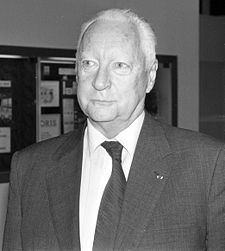 |
Pierre Messmer Pierre Messmer Pierre Joseph Auguste Messmer was a French Gaullist politician. He served as Minister of Armies under Charles de Gaulle from 1960 to 1969 – the longest serving since Étienne François, duc de Choiseul under Louis XV – and then as Prime Minister under Georges Pompidou from 1972 to 1974... |
1 | 6 July 1972 | 5 Apr. 1973 | Union of Democrats for the Republic | |||
| 2 | 5 Apr. 1973 | 1 Mar. 1974 | V (1973 French legislative election, 1973 French legislative elections took place on 4 and 11 March 1973 to elect the 5th National Assembly of the Fifth Republic.In order to end the May 1968 crisis, President Charles de Gaulle dissolved the National Assembly and his party, the Gaullist Party Union of Democrats for the Republic , obtained... ) |
|||||
| 3 | 1 Mar. 1974 | 27 May 1974 | ||||||
| Jacques Chirac Jacques Chirac Jacques René Chirac is a French politician who served as President of France from 1995 to 2007. He previously served as Prime Minister of France from 1974 to 1976 and from 1986 to 1988 , and as Mayor of Paris from 1977 to 1995.After completing his studies of the DEA's degree at the... |
1 | 27 May 1974 | 26 Aug. 1976 | Union of Democrats for the Republic | Valéry Giscard d'Estaing Valéry Giscard d'Estaing Valéry Marie René Georges Giscard d'Estaing is a French centre-right politician who was President of the French Republic from 1974 until 1981... (1974–1981) |
|||
| Raymond Barre Raymond Barre Raymond Octave Joseph Barre was a French centre-right politician and economist. He was a Vice President of the European Commission and Commissioner for Economic and Financial Affairs under three Presidents and later served as Prime Minister under Valéry Giscard d'Estaing from 1976 until 1981... |
1 | 26 August 1976 | 29 Mar. 1977 | Independent (attached to Union for French Democracy Union for French Democracy The Union for French Democracy was a French centrist political party. It was founded in 1978 as an electoral alliance to support President Valéry Giscard d'Estaing in order to counterbalance the Gaullist preponderance over the right. This name was chosen due to the title of Giscard d'Estaing's... ) |
||||
| 2 | 29 Mar. 1977 | 31 Mar. 1978 | ||||||
| 3 | 31 Mar. 1978 | 21 May 1981 | VI (1978 French legislative election, 1978 The French legislative elections took place on 12 March and 19 March 1978 to elect the 6th National Assembly of the Fifth Republic.On 2 April 1974 President Georges Pompidou died. The non-Gaullist center-right leader Valéry Giscard d'Estaing was elected to succeed him... ) |
|||||
| Pierre Mauroy Pierre Mauroy Pierre Mauroy is a French Socialist politician and former Prime Minister under François Mitterrand . Mauroy also served as Mayor of Lille from 1973 to 2001. Mauroy is currently emeritus mayor of Lille.-Biography:... |
1 | 21 May 1981 | 23 June 1981 | Socialist Party | François Mitterrand François Mitterrand François Maurice Adrien Marie Mitterrand was the 21st President of the French Republic and ex officio Co-Prince of Andorra, serving from 1981 until 1995. He is the longest-serving President of France and, as leader of the Socialist Party, the only figure from the left so far elected President... (1981–1995) |
|||
| 2 | 23 June 1981 | 23 Mar. 1983 | VII (1981 French legislative election, 1981 French legislative elections took place on 14 June and 21 June 1981 to elect the 7th National Assembly of the Fifth Republic.On 10 May 1981 François Mitterrand was elected President of France. He became the first Socialist to win this post under universal suffrage... ) |
|||||
| 3 | 23 Mar. 1983 | 17 July 1984 | ||||||
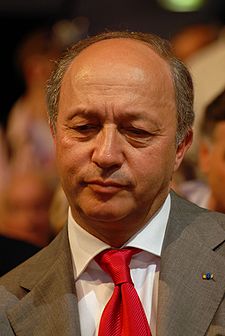 |
Laurent Fabius Laurent Fabius Laurent Fabius is a French Socialist politician. He served as Prime Minister from 17 July 1984 to 20 March 1986. He was 37 years old when he was appointed and is, so far, the youngest Prime Minister of the Fifth Republic.-Early life:... |
• | 17 July 1984 | 20 March 1986 | Socialist Party | |||
| Jacques Chirac Jacques Chirac Jacques René Chirac is a French politician who served as President of France from 1995 to 2007. He previously served as Prime Minister of France from 1974 to 1976 and from 1986 to 1988 , and as Mayor of Paris from 1977 to 1995.After completing his studies of the DEA's degree at the... |
2 | 20 March 1986 | 10 May 1988 | Rally for the Republic Rally for the Republic The Rally for the Republic , was a French right-wing political party. Originating from the Union of Democrats for the Republic , it was founded by Jacques Chirac in 1976 and presented itself as the heir of Gaullism... |
VIII (1986 French legislative election, 1986 The French legislative elections took place on 16 March 1986 to elect the 8th National Assembly of the Fifth Republic. Contrary to other legislative elections of the Fifth Republic, the electoral system used was that of Party-list proportional representation.Since the 1981 election of François... ) |
|||
 |
Michel Rocard Michel Rocard Michel Rocard is a French politician, member of the Socialist Party . He served as Prime Minister under François Mitterrand from 1988 to 1991, during which he created the Revenu minimum d'insertion , a social minimum welfare program for indigents, and led the Matignon Accords regarding the status... |
1 | 10 May 1988 | 22 June 1988 | Socialist Party | |||
| 2 | 23 June 1988 | 15 May 1991 | IX (1988 French legislative election, 1988 French legislative elections took place on 5 June and 12 June 1988 to elect the 9th National Assembly of the Fifth Republic, one month after the re-election of François Mitterrand as President of France.... ) |
|||||
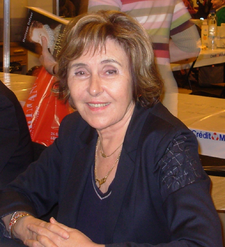 |
Édith Cresson Édith Cresson Édith Cresson is a French politician. She was the first and so far only woman to have held the office of Prime Minister of France.- French Prime Minister :Cresson was appointed to the prime ministerial post by President François Mitterrand on 15 May 1991... |
• | 15 May 1991 | 2 April 1992 | Socialist Party | |||
 |
Pierre Bérégovoy Pierre Bérégovoy Pierre Eugène Bérégovoy was a French Socialist politician. He served as Prime Minister under François Mitterrand from 1992 to 1993.-Early career:... |
• | 2 April 1992 | 29 March 1993 | Socialist Party | |||
| Édouard Balladur Édouard Balladur Édouard Balladur is a French politician who served as Prime Minister of France from 29 March 1993 to 10 May 1995.-Biography:Balladur was born in İzmir, Turkey, to an Armenian Catholic family with five children and long-standing ties to France... |
• | 29 March 1993 | 18 May 1995 | Rally for the Republic Rally for the Republic The Rally for the Republic , was a French right-wing political party. Originating from the Union of Democrats for the Republic , it was founded by Jacques Chirac in 1976 and presented itself as the heir of Gaullism... |
X (1993 French legislative election, 1993 French legislative elections took place on 21 and 28 March 1993 to elect the 10th National Assembly of the Fifth Republic.Since 1988, President François Mitterrand and his Socialist cabinets had relied on a relative parliamentary majority. Without the support of the Communists, Prime minister... ) |
|||
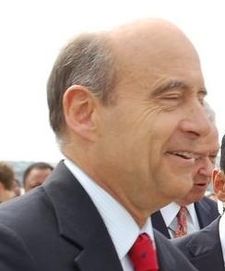 |
Alain Juppé Alain Juppé Alain Marie Juppé is a French politician currently serving as the Minister of Foreign Affairs. He also served as Prime Minister of France from 1995 to 1997 under President Jacques Chirac and the Minister of Defence and Veterans Affairs from 2010 to 2011... |
1 | 18 May 1995 | 7 Nov. 1995 | Rally for the Republic Rally for the Republic The Rally for the Republic , was a French right-wing political party. Originating from the Union of Democrats for the Republic , it was founded by Jacques Chirac in 1976 and presented itself as the heir of Gaullism... |
Jacques Chirac Jacques Chirac Jacques René Chirac is a French politician who served as President of France from 1995 to 2007. He previously served as Prime Minister of France from 1974 to 1976 and from 1986 to 1988 , and as Mayor of Paris from 1977 to 1995.After completing his studies of the DEA's degree at the... 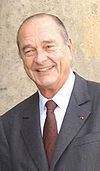 (1995–2007) |
||
| 2 | 7 Nov. 1995 | 3 June 1997 | ||||||
| Lionel Jospin Lionel Jospin Lionel Jospin is a French politician, who served as Prime Minister of France from 1997 to 2002.Jospin was the Socialist Party candidate for President of France in the elections of 1995 and 2002. He was narrowly defeated in the final runoff election by Jacques Chirac in 1995... |
• | 3 June 1997 | 6 May 2002 | Socialist Party | XI (1997 French legislative election, 1997 French legislative election took place on 25 May and 1 June 1997 to elect the 11th National Assembly of the Fifth Republic. It was the consequence of President Jacques Chirac's decision to call the legislative election one year before the deadline.... ) |
|||
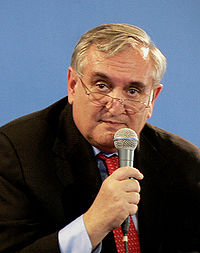 |
Jean-Pierre Raffarin Jean-Pierre Raffarin Jean-Pierre Raffarin is a French conservative politician and senator for Vienne.Jean-Pierre Raffarin served as the Prime Minister of France from 6 May 2002 to 31 May 2005, resigning after France's rejection of the referendum on the European Union draft constitution. However, after Raffarin... |
1 | 7 May 2002 | 17 June 2002 | Union for a Popular Movement Union for a Popular Movement The Union for a Popular Movement is a centre-right political party in France, and one of the two major contemporary political parties in the country along with the center-left Socialist Party... |
|||
| 2 | 17 June 2002 | 30 Mar. 2004 | XII (2002 French legislative election, 2002 -12th Assembly by Parliamentary Group:... ) |
|||||
| 3 | 31 Mar. 2004 | 31 May 2005 | ||||||
| Dominique de Villepin Dominique de Villepin Dominique Marie François René Galouzeau de Villepin is a French politician who served as the Prime Minister of France from 31 May 2005 to 17 May 2007.... |
• | 31 May 2005 | 17 May 2007 | Union for a Popular Movement Union for a Popular Movement The Union for a Popular Movement is a centre-right political party in France, and one of the two major contemporary political parties in the country along with the center-left Socialist Party... |
||||
| François Fillon François Fillon François Charles Armand Fillon is the Prime Minister of France. He was appointed to that office by President Nicolas Sarkozy on 17 May 2007. He served initially until 13 November 2010 when he resigned from being prime minister before a planned cabinet reshuffle.On 14 November 2010, Sarkozy... |
1 | 17 May 2007 | 18 June 2007 | Union for a Popular Movement Union for a Popular Movement The Union for a Popular Movement is a centre-right political party in France, and one of the two major contemporary political parties in the country along with the center-left Socialist Party... |
Nicolas Sarkozy Nicolas Sarkozy Nicolas Sarkozy is the 23rd and current President of the French Republic and ex officio Co-Prince of Andorra. He assumed the office on 16 May 2007 after defeating the Socialist Party candidate Ségolène Royal 10 days earlier....  (2007– ) |
|||
| 2 | 19 June 2007 | 13 Nov. 2010 | XIII 13th Legislature (France) The 13th Legislature of France is the current parliamentary cycle started in June 2007 and scheduled to last until June 2012. It was created after the 2007 legislative election that took place on 10 and 17 June 2007... (2007 French legislative election, 2007 The French legislative elections took place on 10 June and 17 June 2007 to elect the 13th National Assembly of the Fifth Republic, a few weeks after the French presidential election run-off on 6 May. 7,639 candidates stood for 577 seats, including France's overseas possessions... ) |
|||||
| 3 | 14 Nov. 2010 | Incumbent | ||||||
See also
- History of FranceHistory of FranceThe history of France goes back to the arrival of the earliest human being in what is now France. Members of the genus Homo entered the area hundreds of thousands years ago, while the first modern Homo sapiens, the Cro-Magnons, arrived around 40,000 years ago...
- List of Foreign Ministers of France
- Politics of FrancePolitics of FranceFrance is a semi-presidential representative democratic republic, in which the President of France is head of state and the Prime Minister of France is the head of government, and there is a pluriform, multi-party system. Executive power is exercised by the government. Legislative power is...
- President of the French RepublicPresident of the French RepublicThe President of the French Republic colloquially referred to in English as the President of France, is France's elected Head of State....
External links
- List on the website of the French Prime Minister (in French)

